M&TT Colloquia 2024-2025
03-07-2025 - Lecture Hall E
Mini-Symposium: Social Talk
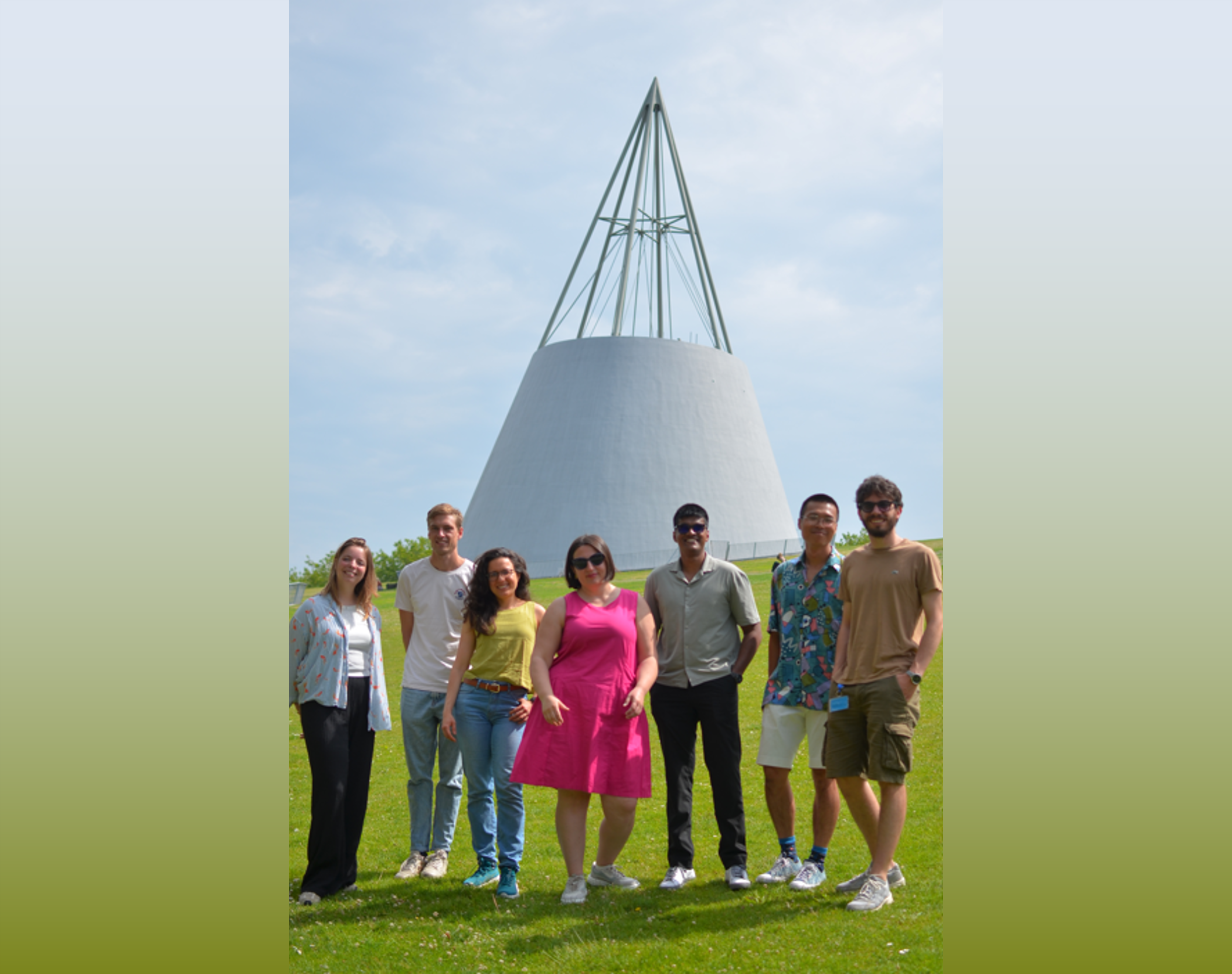
Adaptivity is key!
Jovana Jovanova
Jovana and her research group will present the motivation for their work, their values, and the role of diversity in shaping the group dynamics. They will share their thoughts on the concept of Work-Life Integrated Design: how their personal journey was shaped by the career choice and how their lives were enriched because of their work experiences. Personal stories on how they got to TU Delft, alongside what they are currently working on, will show the importance of adaptation is life and in research. The challenges of adapting to a new academic environment can lead to the benefit of adopting different behavior for personal development. Jovana will also share how her research was inspired by different international experiences, and how they all became puzzle pieces in her own professional trajectory. Her vision for the future centers around Adaptive Structures and her group works to unlock their potential in the Maritime and Transport Tecnology.
26-06-2025 - Lecture Hall E
PostDoc presentation
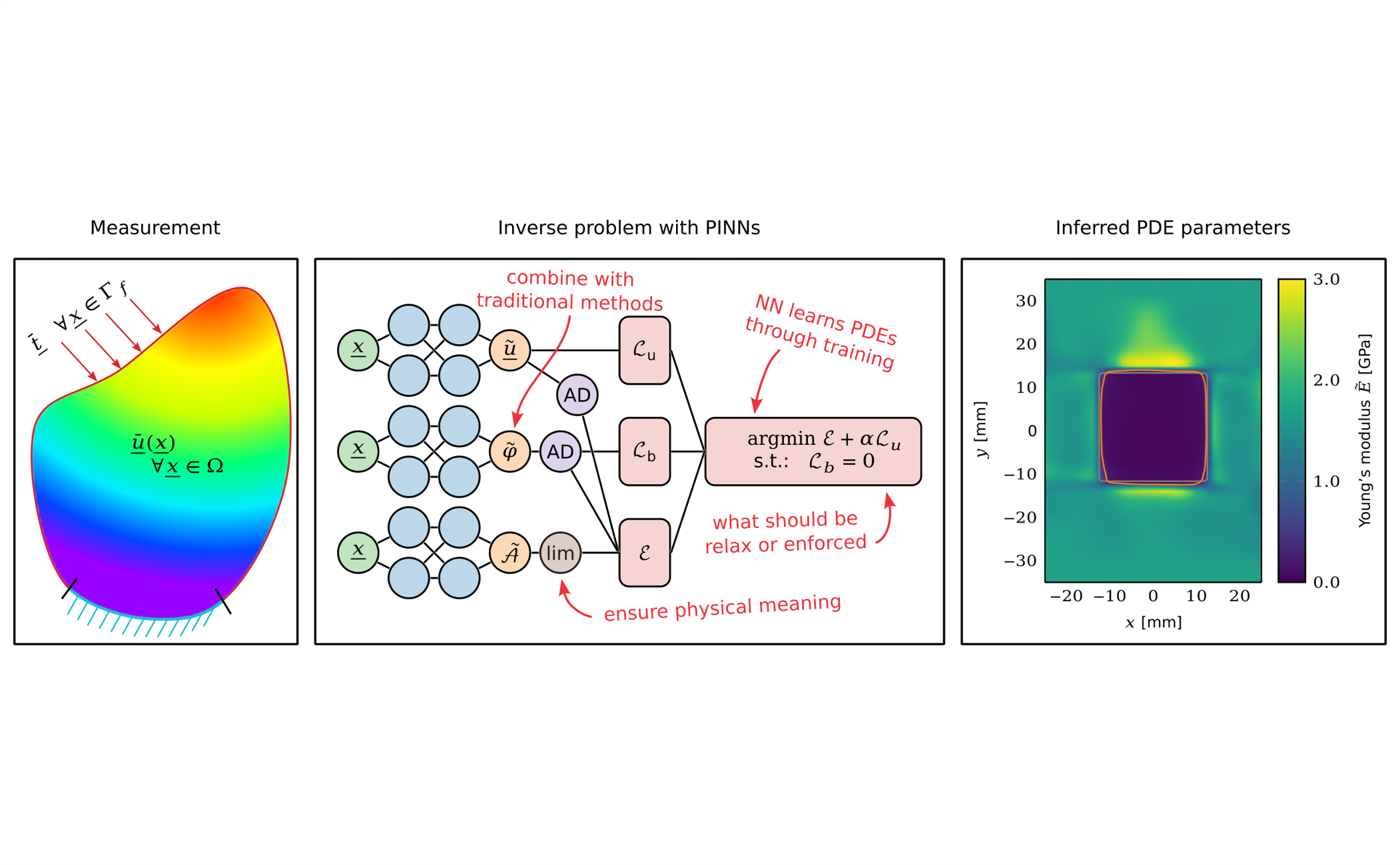
Inverse Methods: Determine Material Properties with PINNs
Bram van der Heijden
This presentation introduces Physics-Informed Neural Networks (PINNs) as a modern approach to solving inverse problems in solid mechanics. PINNs teach physical laws, such as PDEs, to NNs, enabling machine learning with limited data. While they offer significant speed and flexibility compared to traditional methods, they also come with notable challenges, especially regarding accuracy, stability, and error control. These benefits and drawbacks are illustrated through a practical example: identifying spatially varying material properties from displacement and load measurements. The talk will explore how these limitations can be addressed by incorporating classical mechanics principles, such as Airy stress potentials and constrained optimization, into the PINN framework. These refinements not only improve solution quality and robustness but also enable error estimation and model validation. Beyond demonstrating technical improvements, the presentation aims to offer a clear and critical introduction to PINNs. I hope that you will gain some practical insights, a clearer understanding of the method’s capabilities and limitations, and a solid starting point for exploring machine learning in mechanics.
19-06-2025 - Lecture Hall E
PostDoc presentation
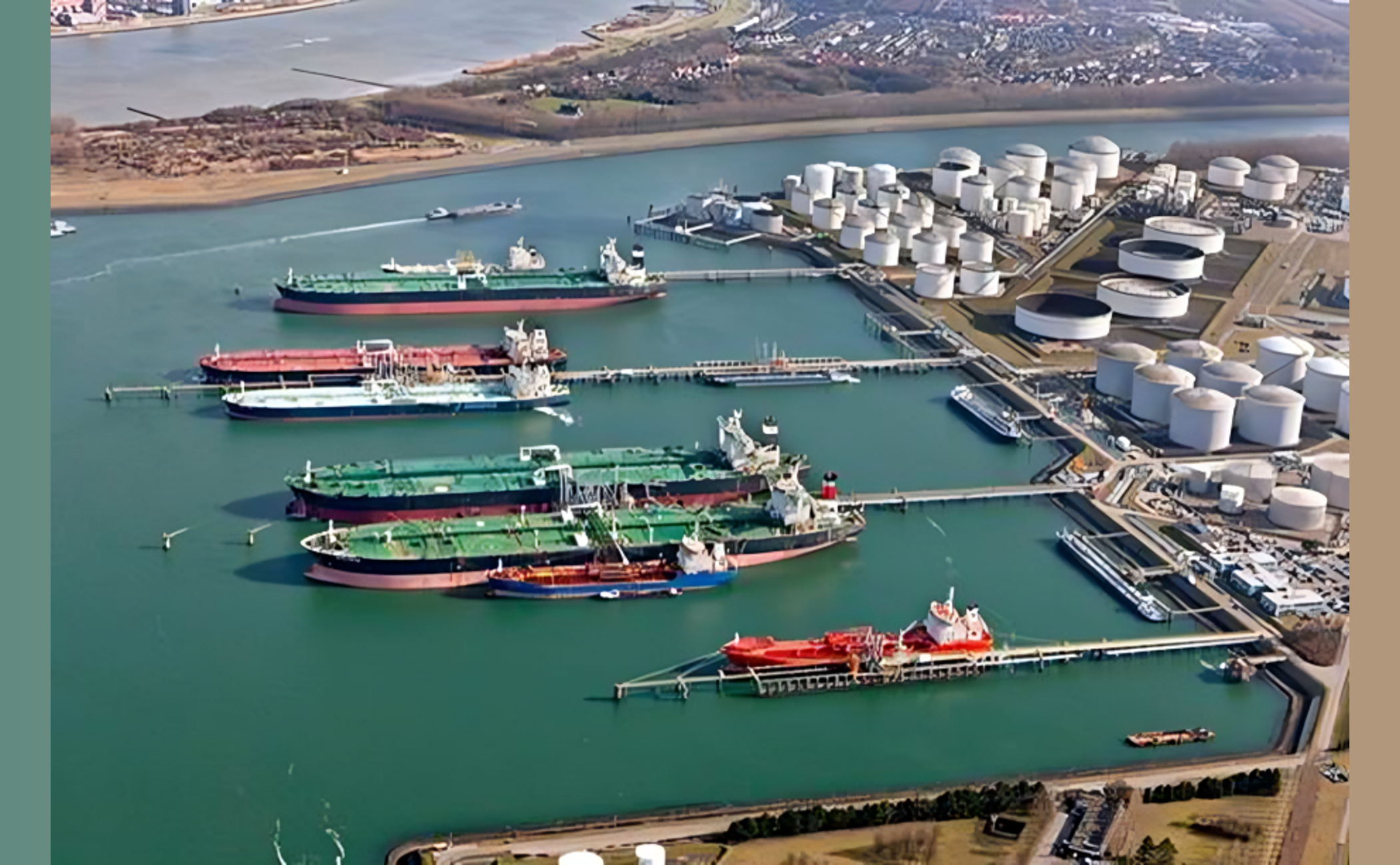
Preparing Ports for Alternative Fuels: Ammonia Demand Prediction at the Port of Rotterdam
Wenhua Qu
This study presents a prediction framework for ammonia bunkering demand at the Port of Rotterdam, aimed at supporting strategical infrastructure planning and tactical readiness for the maritime energy transition. A hybrid methodology is employed, combining conventional estimation techniques with data-driven machine learning models to capture both long term demand growth and short term demand fluctuations. Annual demand forecasts are developed through top-down approach and bottom-up approach under multiple scenarios together with the growth trend analysis. In parallel, short term predictions, on daily scales, are generated using regression based machine learning models, trained on data provided by the Port of Rotterdam. The results provide three key contributions: (i) the prediction results can inform strategic decision-making for port infrastructure planning and the management of bunkering operations; (ii) the key drivers affecting demand growth and demand fluctuations are identified and evaluated. Their relative importance in shaping the future demand at different levels are ranked; and (iii) the proposed framework is designed for adaptability and transferability, making it suitable for application for other ports or for other alternative marine fuels.
05-06-2025 - Lecture Hall I
PhD presentation
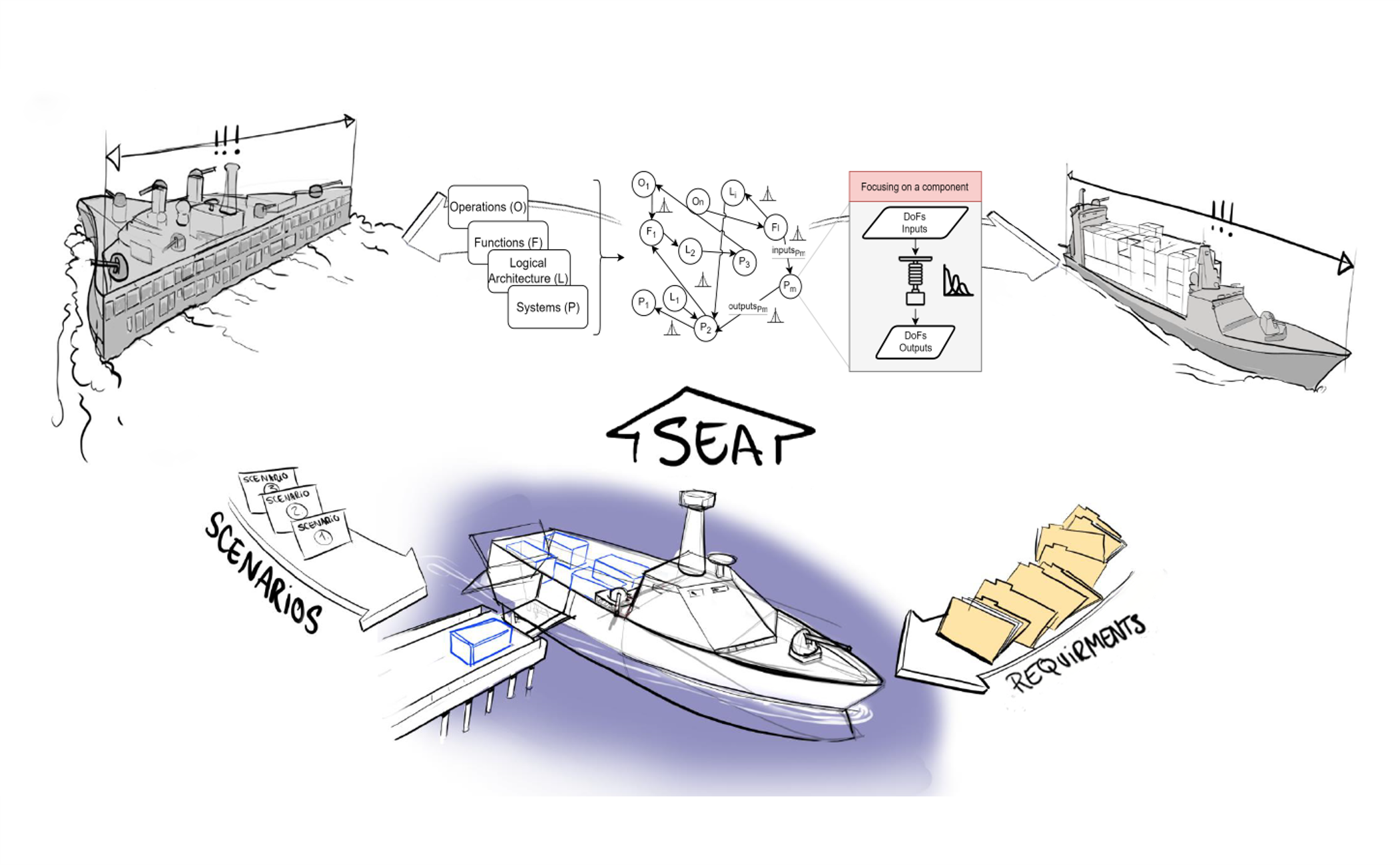
Systems Elements Analysis (SEA): A Finite Element Analogy approach to MBSE for Naval Ship Design under Uncertainty
Zacharias Oikonomou
Uncertainty in the shipping industry has recently increased due to new environmental regulations, such as EEXI and SEEMP, emerging technologies, including alternative fuels and tubeless stern bearings, novel operations, like seabed and drone warfare, as well as risks, including pandemics and global unrest. To tackle these uncertainties and design vessels, particularly naval vessels, a multidisciplinary approach is required to explore the design space and the associated uncertainties, aiming at integrating all aspects of the ship into a cohesive model. Model-Based Systems Engineering (MBSE) has been used to understand the systems architecture interdependencies; however, a gap exists in describing, understanding, and simulating the interactions between the systems architecture components. To address this gap, we propose the Systems Elements Analysis (SEA) methodology, a FEM analogy-based approach to the MBSE framework, treating the systems architecture components, Operations, Functions, Logical Functions, and Physical Systems (OFLP) as nodes of a virtual truss structure to construct a stiffness matrix similar to a classical FEA. The insights gained from this approach include a systematic way to explore the systems architecture design space and a methodology to quantify the interactions of the OFLP components, leading to a clearer understanding of the complexities of ship design.
05-06-2025 - Lecture Hall I
PhD presentation
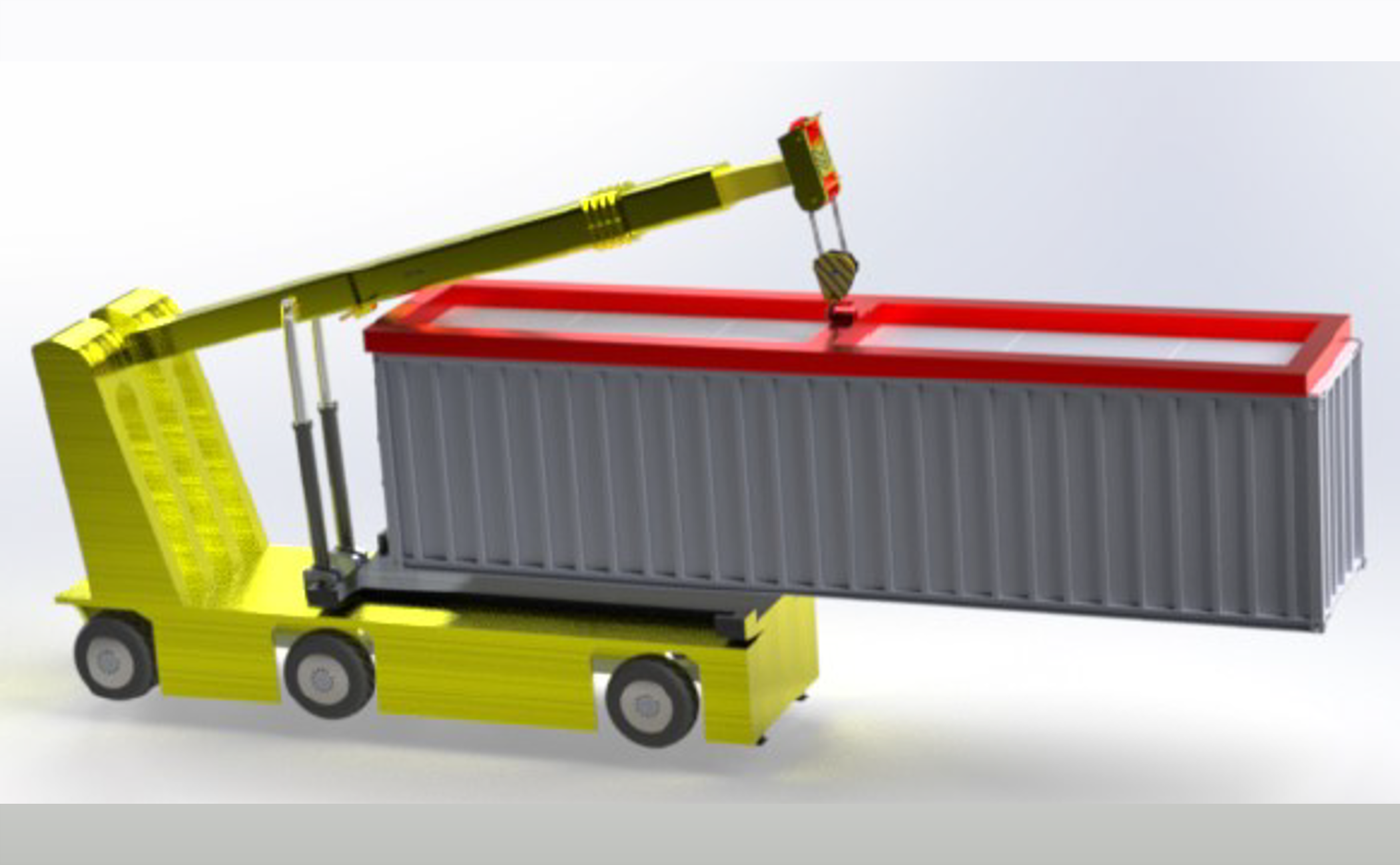
Design and Prototyping of automated transshipment concept for inter-terminal barge operations
Chamod Wijesinghe
The study onto automation has taken great progress over the past years due to the increase in computational capabilities and resources available to develop the needed technologies. However, the level of automation being applied to Ports is on a slower pace due to conflicts that occur with workers and the environment on which the machines would have to operate on. Majority of studies onto the field of automation of ports consists of the theoretical applications that can be integrated onto existing machines such that better feedback is to be provided to the operator. Within this project an automated container handling system that utilizes the “Kiss and Ride” concept used in transportation hubs around the world is suggested. With the use of concepts such as automated navigation, automated manipulation, and real time monitoring, the system proposed would aim to optimize the container handling process in ports. Project would demonstrate the benefits of implementing a system with the Kiss and Ride concept and how the system is to be designed to achieve the objective required.
08-05-2025 - Lecture Hall C
Mini Symposium
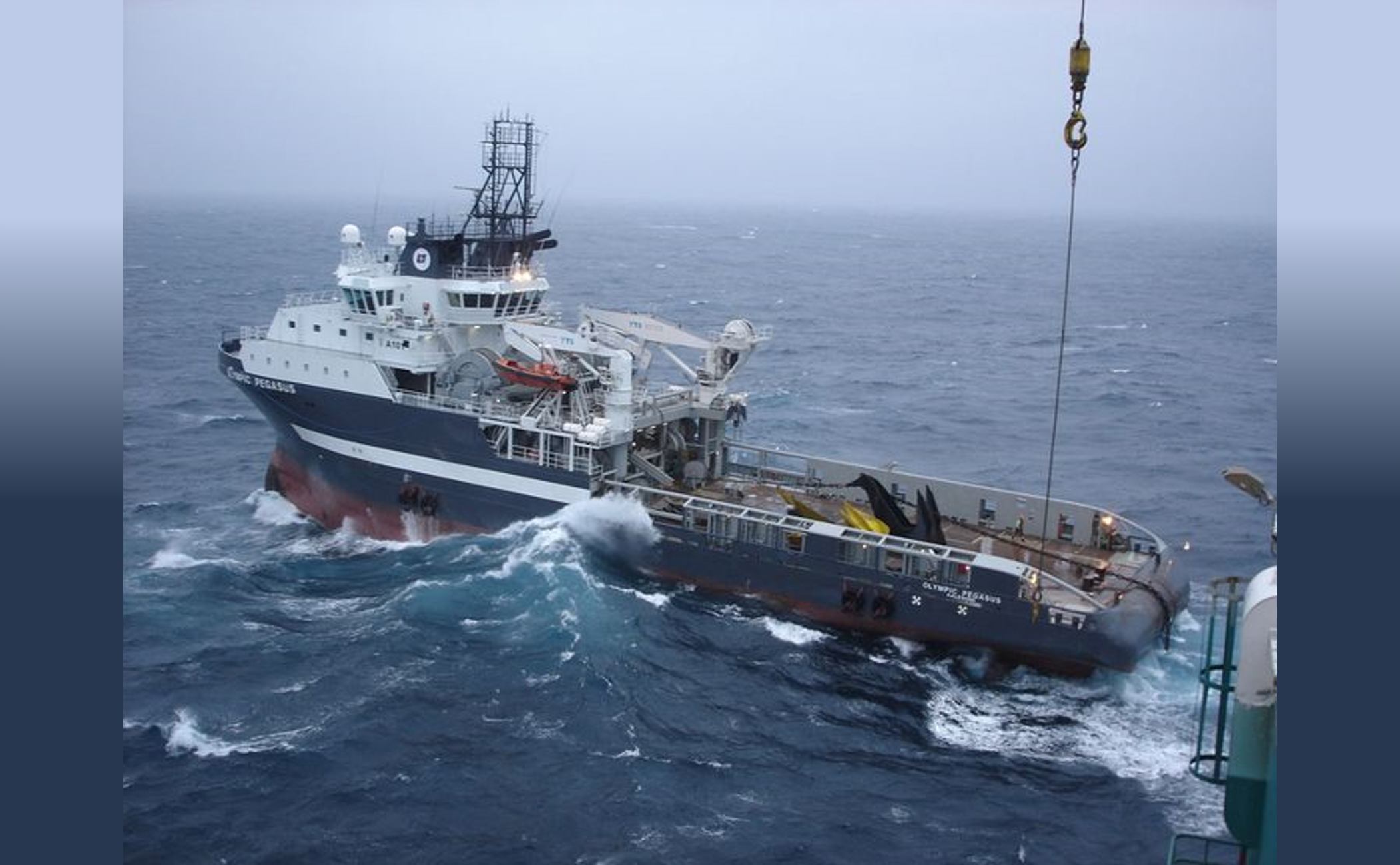
Onboard wave and motion prediction for offshore wind operations: from PhD to start-up.
Peter Naaijen
Operability of many offshore operations is limited because of waves and wave induced motions of the involved vessels. These operations vary from transferring people from ships to offshore wind turbines to installing wind turbine parts with floating cranes. Operability has always been considered from the statistical point of view: operations are considered safe if the probability of a certain hazardous situation is sufficiently low. Technology to predict on a short term (1-4 minutes in advance) when exactly such situation will occur can drastically change how we look at operability. This presentation will be about how remote wave observations with radar can provide early warning for large waves and related hazards, and address some aspects of the journey from PhD research to product development in a start-up.
17-04-2025 - Lecture Hall E
PostDoc presentation
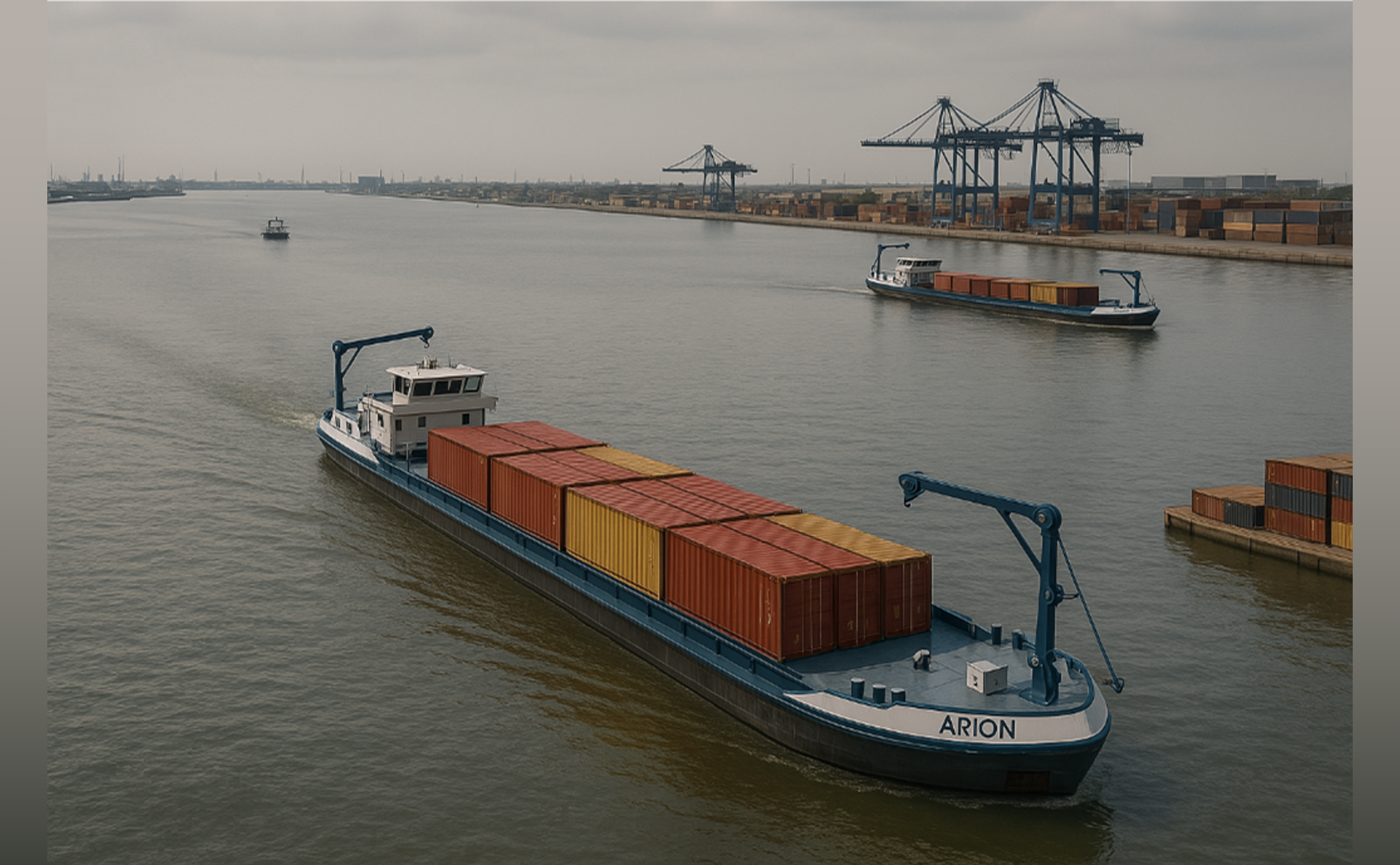
Navigating the Future: Towards Fully Autonomous Docking and In-Port Navigation
Javier García Martín
As the maritime sector moves toward increased automation, one of the most challenging tasks to be fully delegated to autonomous systems is docking. These operations require precise, flexible, and safe maneuvers in dynamic and often unpredictable environments such as busy ports, with changing weather conditions and unforeseen obstacles. This presentation introduces recent research on this operation, with a focus on Nonlinear Model Predictive Control based techniques. A particular emphasis is placed on Time-Instant Optimization NMPC, an approach in which the timing between control actions is part of the optimization problem itself—improving both flexibility and performance. Additionally, Control Barrier Functions (CBFs) are being implemented to guarantee safety by enforcing collision avoidance, even in the presence of moving obstacles such as other vessels.
17-04-2025 - Lecture Hall E
PostDoc presentation
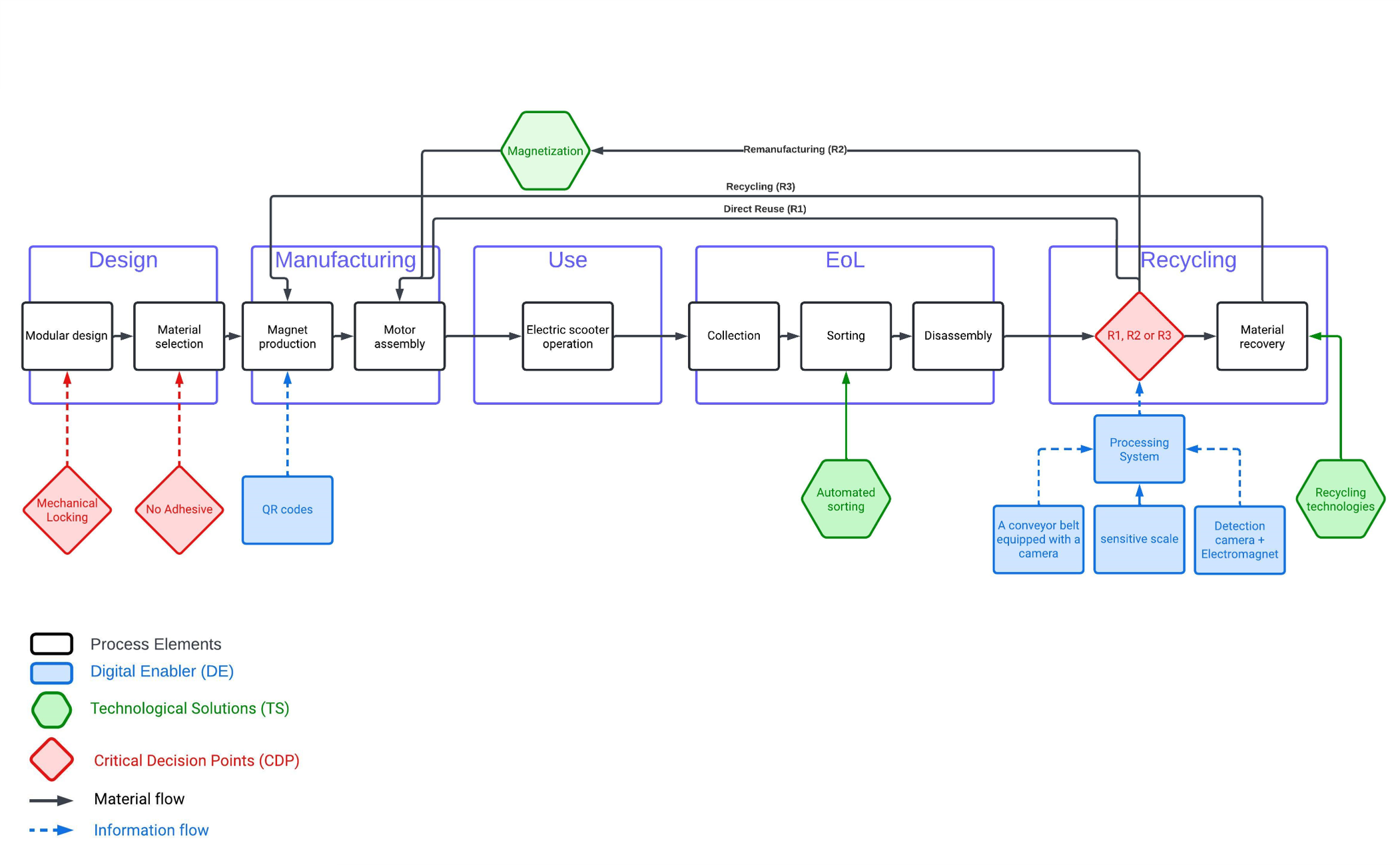
Circular Value Chains for Rare Earth Elements in Electric Motors: Design Challenge and Solutions
Sina Khoshsima
The rising demand for electric vehicles determines an increasing demand of rare earth elements (REE) in high-performance magnets. As REE are critical raw materials, solutions that enhance the circularity of REE - i.e. their reuse, remanufacturing, and recycling in the related value chains – are needed. While innovative technologies are available, these solutions are still far from implementation in industry. To understand this challenge, this paper focuses on electric motors, and identifies a configuration of the electric motor’s value chain that supports the circularity of REE. Based on literature and on the authors’ experience, technologies and solutions that promise to support the circularity of REE in this circular configuration are pinpointed. The provided overview can be used in future research to support industrial implementation of circular solutions for REE in the value chain of electric motors. In future research, collaboration among different stakeholders (e.g. product designer, manufacturer, distributor, etc.) should be facilitated. The provided analysis can be used by researchers to develop systemic application-focused solutions, moreover, it can be used by industrials and policy makers to identify feasible alternatives to this holistic challenge.
03-04-2025 - Lecture Hall E
PhD presentation
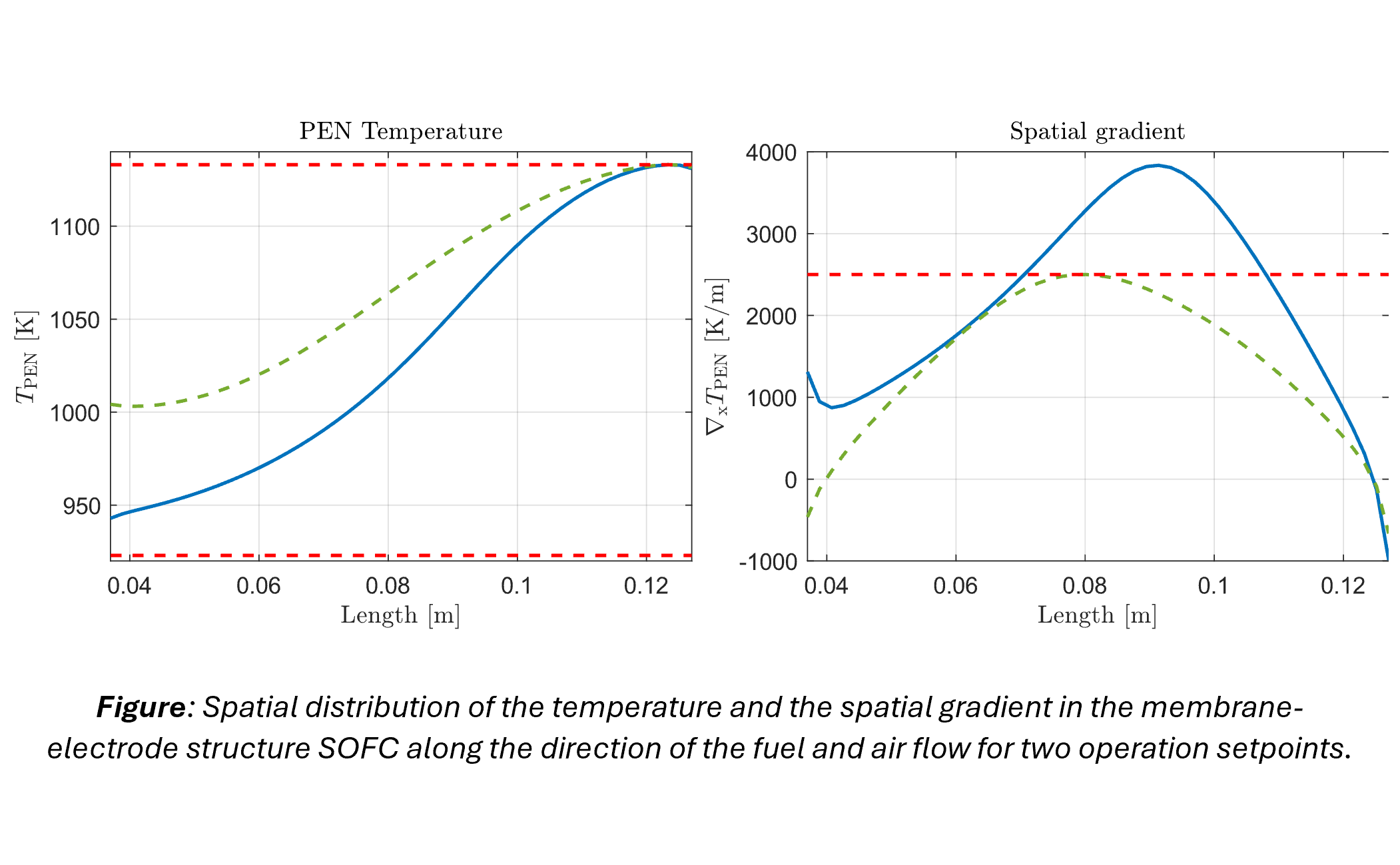
Mitigating Thermal Stress in Solid Oxide Fuel Cells
Matthis de Lange
Solid Oxide Fuel Cells (SOFC) are a promising technology for reducing emissions in the maritime industry. They offer several advantages over other emerging solutions, including fuel flexibility, high efficiency, and low pollution. However, one major challenge with SOFCs is their inherently slow dynamic response to load changes. The issue is not that the power response itself is slow, but rather that rapid power fluctuations impose excessive thermal stress on the SOFC stack. This accelerates degradation and increases the risk of failure. This presentation will explore two indicators for thermal stress in SOFCs: the temporal temperature gradient and the spatial temperature gradient. We will examine how the operating strategy influences these stress factors and analyze the trade-offs involved in using the control strategy to enhance the dynamic load response while mitigating thermal stress.
03-04-2025 - Lecture Hall E
PhD presentation
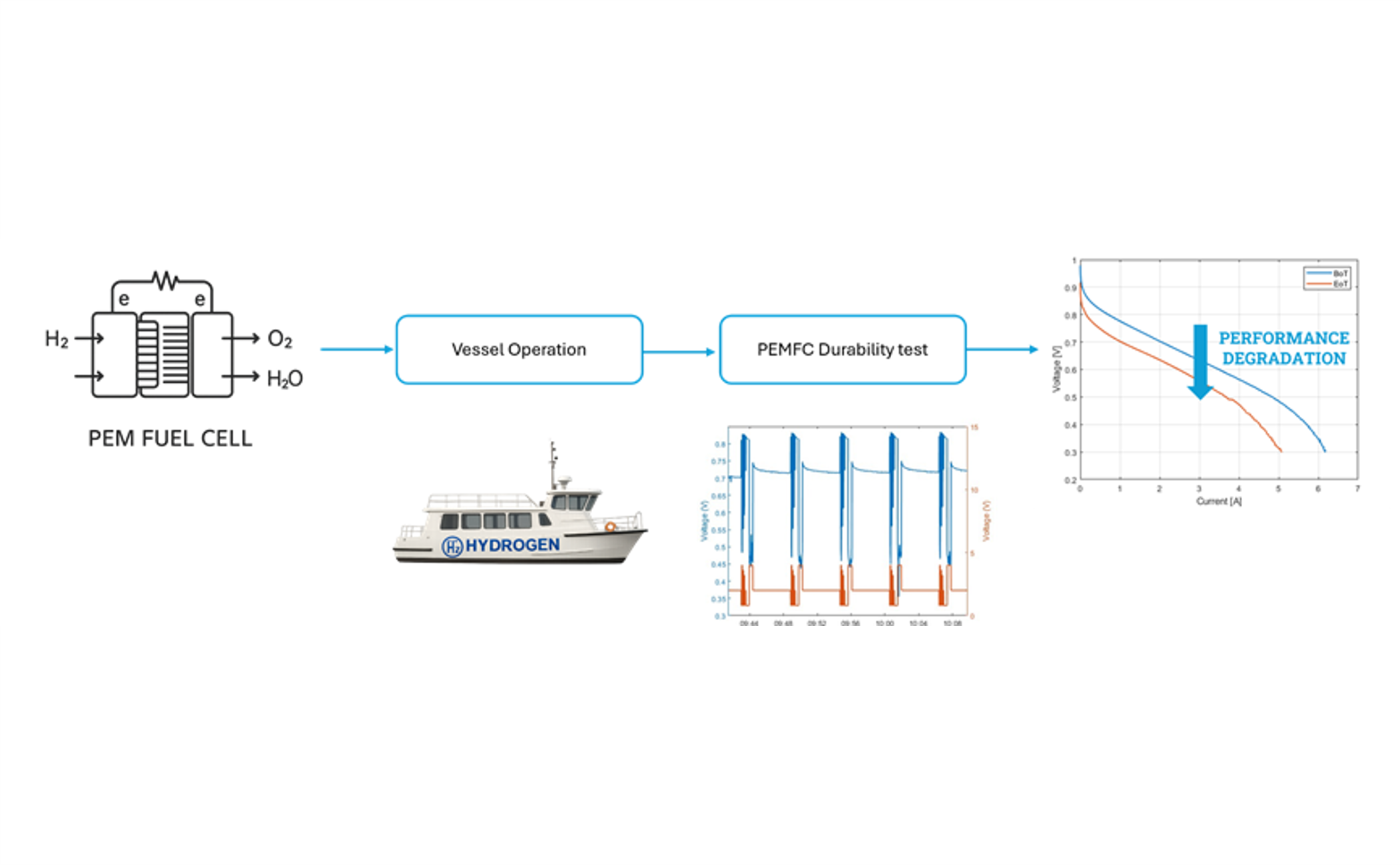
Experimental Study on the Effect of Ship Load Profile on PEMFC Durability
Sara Tamburello
Proton Exchange Membrane Fuel Cells (PEMFCs) are emerging as a promising technology for sustainable energy systems. However, improving their durability is essential to ensure effective and reliable application in the maritime sector. The development of durability enhancement strategies requires a deep understanding of the system’s degradation mechanisms. Currently, most knowledge on PEMFC degradation originates from the automotive sector, where standardized durability testing—such as those based on the New European Driving Cycle (NEDC)—has been developed to simulate real-world vehicle operation and assess long-term performance. However, these protocols are not directly applicable to maritime PEMFC, as ship operational profiles are various and significantly different from automotive ones. To support the broader adoption of PEMFCs in marine applications, there is a critical need for durability testing protocols specifically tailored to maritime operating conditions. My PhD research aims to take the first steps toward the development of such standardized testing procedures. In this presentation, I will introduce a newly developed testing protocol designed to evaluate the durability of PEMFCs under a representative ship load profile. I will provide an overview of preliminary results from the first experimental campaign, highlighting the impact of load-induced degradation on cell performance. Additionally, I will discuss how advanced electrochemical analyses can provide deeper insights into the underlying degradation mechanisms.
20-03-2025 - Lecture Hall L
PhD presentation
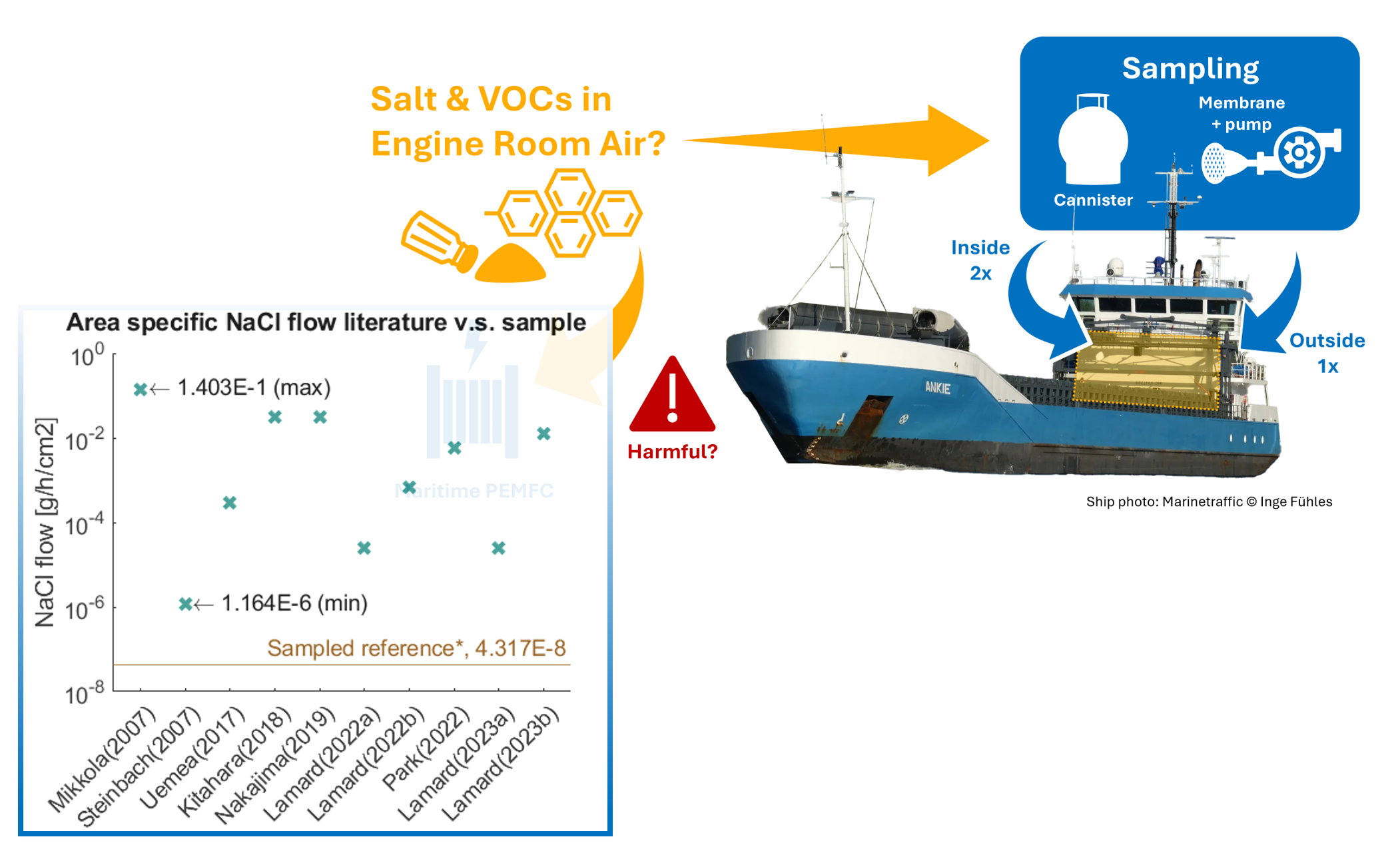
Maritime PEMFC degradation - testing saline air generation
Annabel Broer
Powering ships with Proton Exchange Membrane Fuel Cells (PEMFCs) is one way to achieve zero-emission shipping. They take in hydrogen and air, and only emit water vapor. Even though PEMFCs have been applied in various contexts, using them in ships is still a mostly unexplored field with various additional challenges. One of these is the air salinity which might degrade the fuel cell. We analysed the air quality of a sea-going vessel (see graphical abstract). Surprisingly, we found that experimental salt contamination studies use, on average, five orders of magnitude more salt compared to the highest value sampled in our campaign (see graph). Therefore, the current body research can provide insight into potential degradation mechanisms, but it fails to indicate if PEMFCs will in fact degrade in sea air conditions. The next phase of our research therefore aims to (i) develop a saline air generator and (ii) conduct long-term PEMFC salt contamination tests.
20-03-2025 - Lecture Hall L
PhD presentation
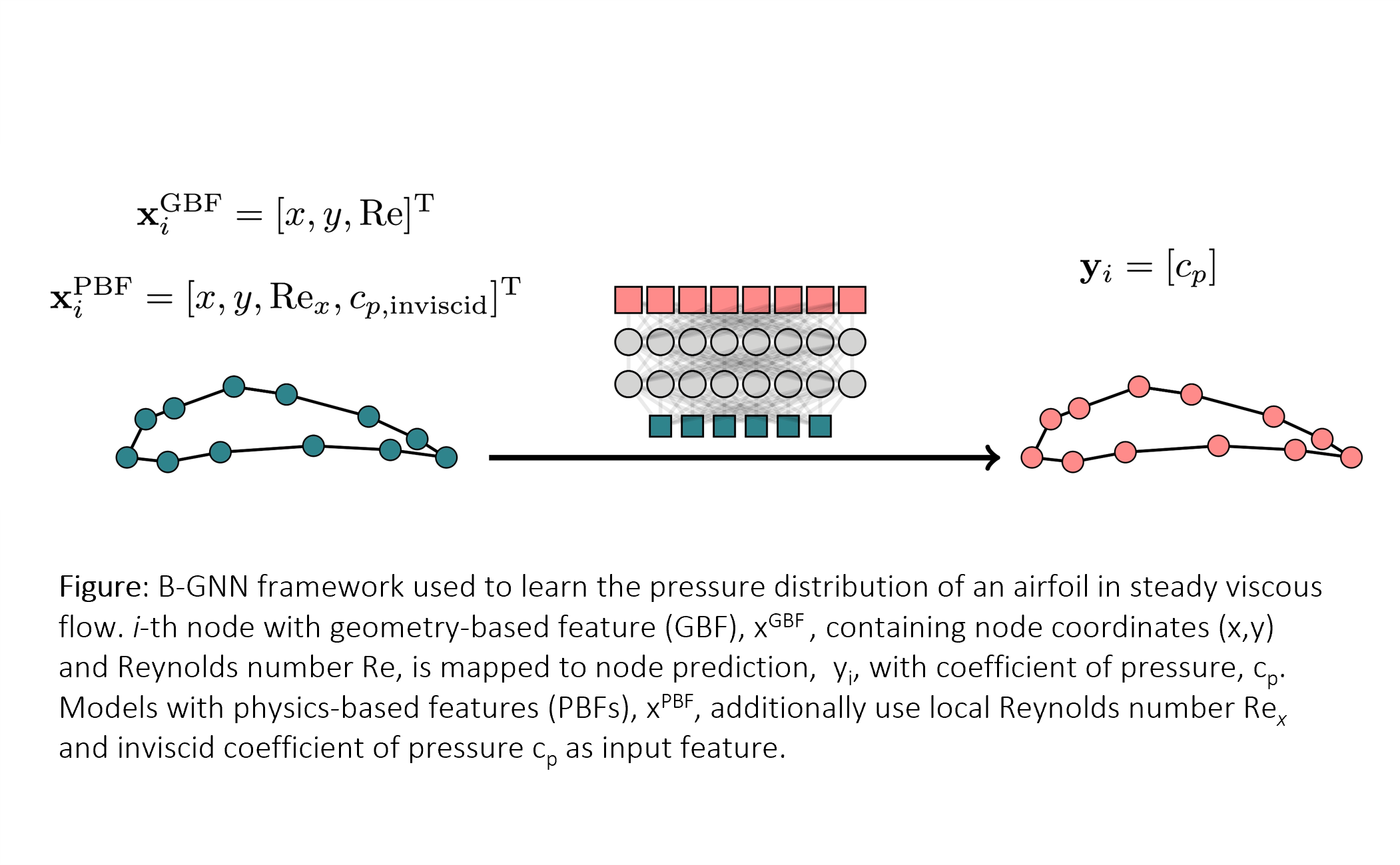
Predicting airfoil pressure distributions using boundary graph neural networks
Sankalp Jena
Surrogate models are essential for fast and accurate surface pressure and friction predictions during design optimization of complex lifting surfaces. This study focuses on predicting pressure distribution over two-dimensional airfoils using graph neural networks (GNNs), leveraging their ability to process non-parametric geometries. We introduce boundary graph neural networks (B-GNNs) that operate exclusively on surface meshes and compare these to previous work on volumetric models operating on volume meshes. All of the training and evaluation is done using the airfRANS (Reynolds-averaged Navier-Stokes) database. We demonstrate the importance of all-to-all communication in GNNs to enforce the global incompressible flow constraint and ensure accurate predictions. We show that supplying the B-GNNs with local physics-based input-features, such as an approximate local Reynolds number Rex and the inviscid pressure distribution from a panel method code, enables a 83% reduction of model size and 87% of training set size relative to models using purely geometric inputs to achieve the same in-distribution prediction accuracy. We investigate the generalization capabilities of the B-GNNs to out-of-distribution predictions on the S809/27 wind turbine blade section and find that incorporating inviscid pressure distribution as a feature reduces error by up to 88% relative to purely geometry-based inputs. Finally, we find that the physics-based model reduces error by 85% compared to the state-of-the-art volumetric model INFINITY.
06-03-2025 - Lecture Hall E
PhD presentation
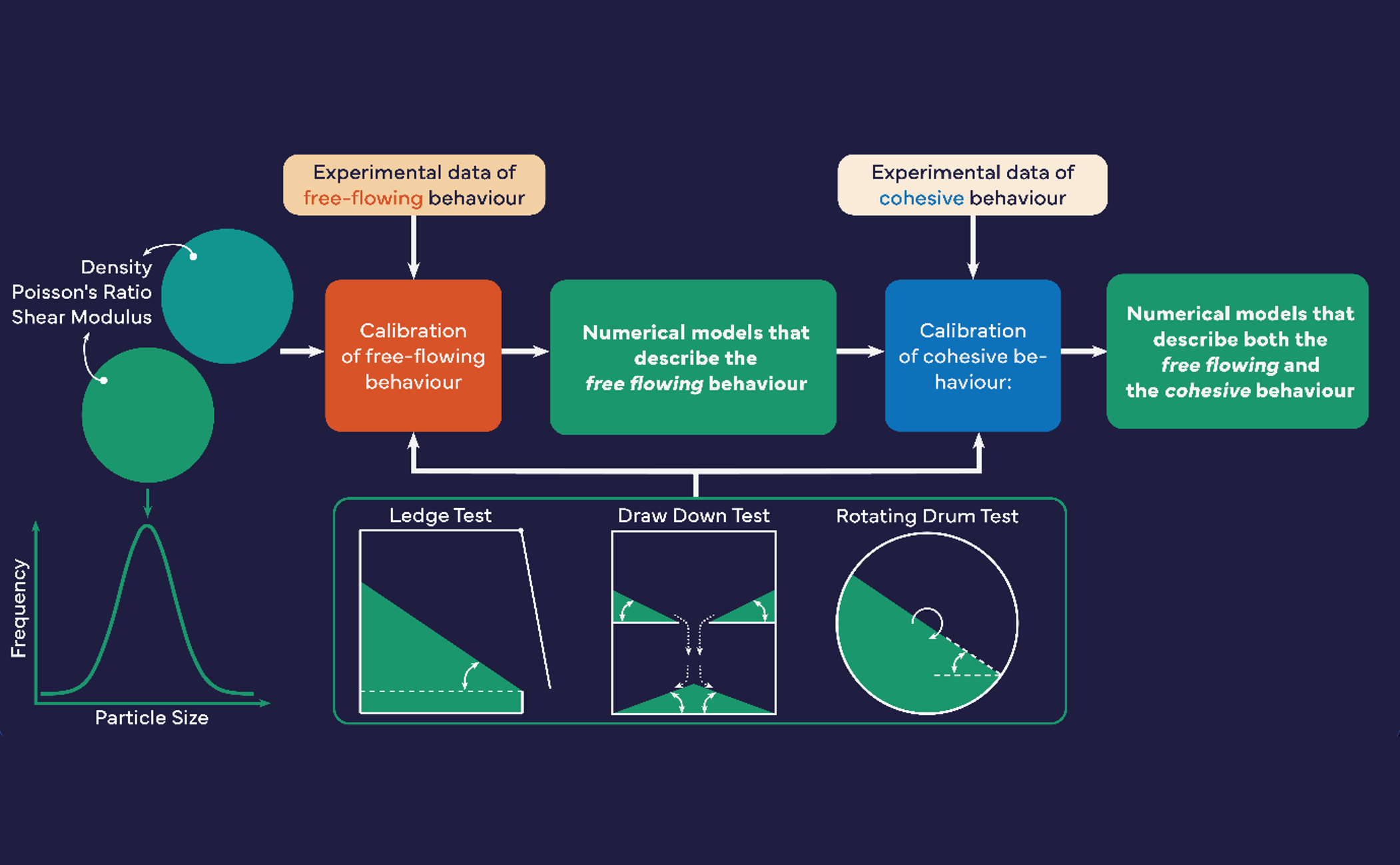
Circular Bunkering for Maritime Vessels using Sodium Borohydride
Marcel van Benten
Solid hydrogen carriers, such as sodium borohydride (NaBH4), present a promising alternative for hydrogen fuel due to their favourable energy density compared to liquid and compressed hydrogen. When NaBH4 is used as fuel, a spent fuel—sodium metaborate—is formed, which must be stored on the vessel for the remainder of the voyage and later regenerated (e.g., through ball-milling) at the destination port, effectively creating a circular fuel economy. One key challenge in implementing solid hydrogen carriers is that granular materials, unlike liquids, exhibit very different flow behaviours. While liquid fuels flow easily and can be handled with established infrastructure, granular fuels like sodium borohydride and sodium metaborate have unique characteristics, such as internal friction, cohesion, and wall friction, that can significantly affect their flowability and handling. Understanding these mechanical properties is crucial for designing efficient storage and handling systems. To address this, we have conducted various experiments to determine the relevant mechanical properties of NaBH4. Using the obtained experimental data, the Discrete Element Method (DEM) is used to develop numerical models to mimic the flow behaviour, as illustrated in the figure above. Ultimately, the combination of experiments and simulations will provide the necessary knowledge to propose design requirements for the storage and handling equipment required to realise the circular fuel economy with NaBH4.
06-03-2025 - Lecture Hall E
PhD presentation
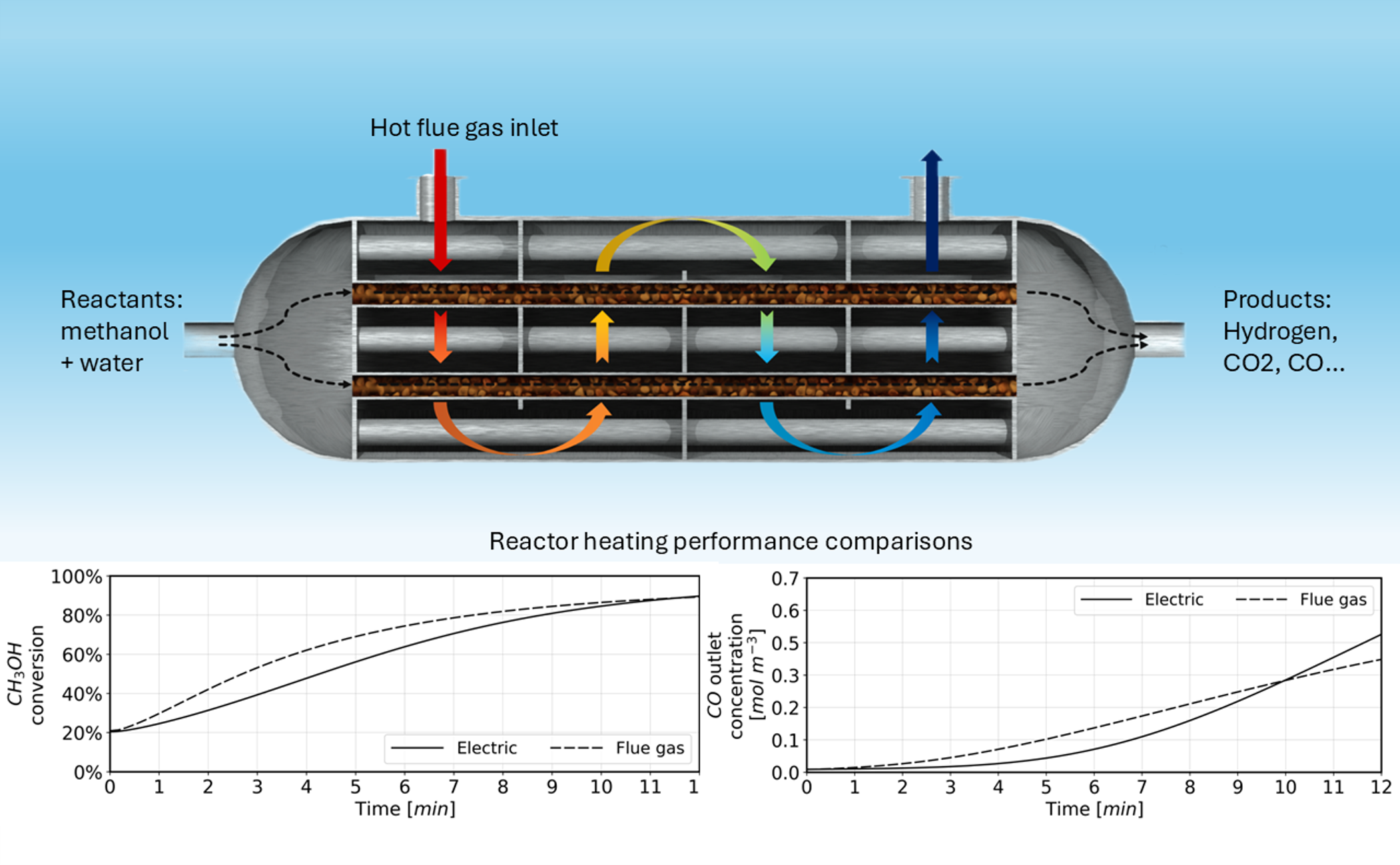
Methanol reforming to hydrogen in maritime applications and beyond
Bojan Grenko
The relevance of methanol in shipping applications is steadily increasing due to stringent maritime emission restrictions. Besides in internal combustion engines, methanol can also be used as hydrogen carrier for fuel cell applications, creating a path for continuous emission decrease and making it more future resilient. The emergent research topic from this outlook is purposing of methanol-to-hydrogen systems for transient operation, characteristic in transport applications. As such systems are currently operated in steady state in chemical processing plants, the challenge starts at defining the suitable tools and methods for unsteady analyses. Present research concludes, through numerical simulation, that the unsteady methanol reforming reactor operation heavily depends on the utilized reactor heating method. As we wait validation for laboratory scale reactor currently under construction, this talk also reflects on research motivation, research convenience for hydrogen related technologies caused by the maritime sector, and application of conclusions beyond the maritime industry.
27-02-2025 - Lecture Hall F
PostDoc presentation
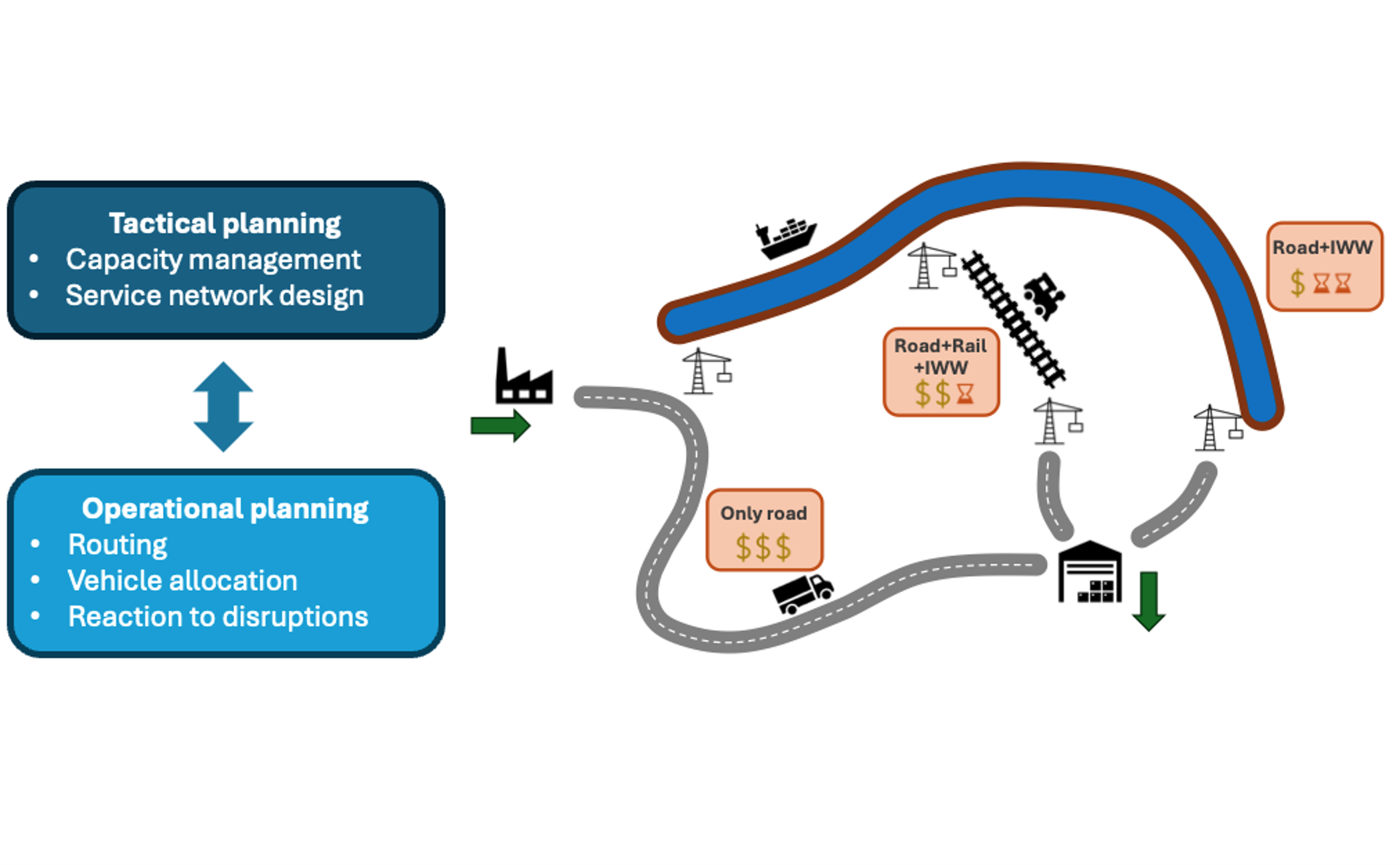
Adaptive optimization for multimodal logistics: A learning-based approach
Javier Durán Micco
Long haul logistics involves many complex decisions, from routing shipments to allocating resources efficiently across different transport modes, such as road, rail and inland waterways. Balancing short-term operational choices with long-term planning is crucial to optimizing costs and efficiency. The ADAPT-OR project develops adaptive methods for logistics, integrating modelling, optimization, and learning components to improve efficiency. This presentation focuses on my work in the Service Network Design problem, optimizing transport routes and capacity planning across multimodal logistics. We use a simulated annealing algorithm to optimize capacity planning and an agent-based simulation model to estimate costs and account for uncertainties. Since simulations are time-consuming, we introduce a surrogate function trained on simulation data to estimate costs efficiently. An adaptive learning technique further refines predictions during optimization. Preliminary results show that our adaptive methods achieve strong performance while significantly reducing computational time. Future work will refine models to better reflect real-world conditions and incorporate dynamic interactions between logistics actors.
27-02-2025 - Lecture Hall F
PostDoc presentation
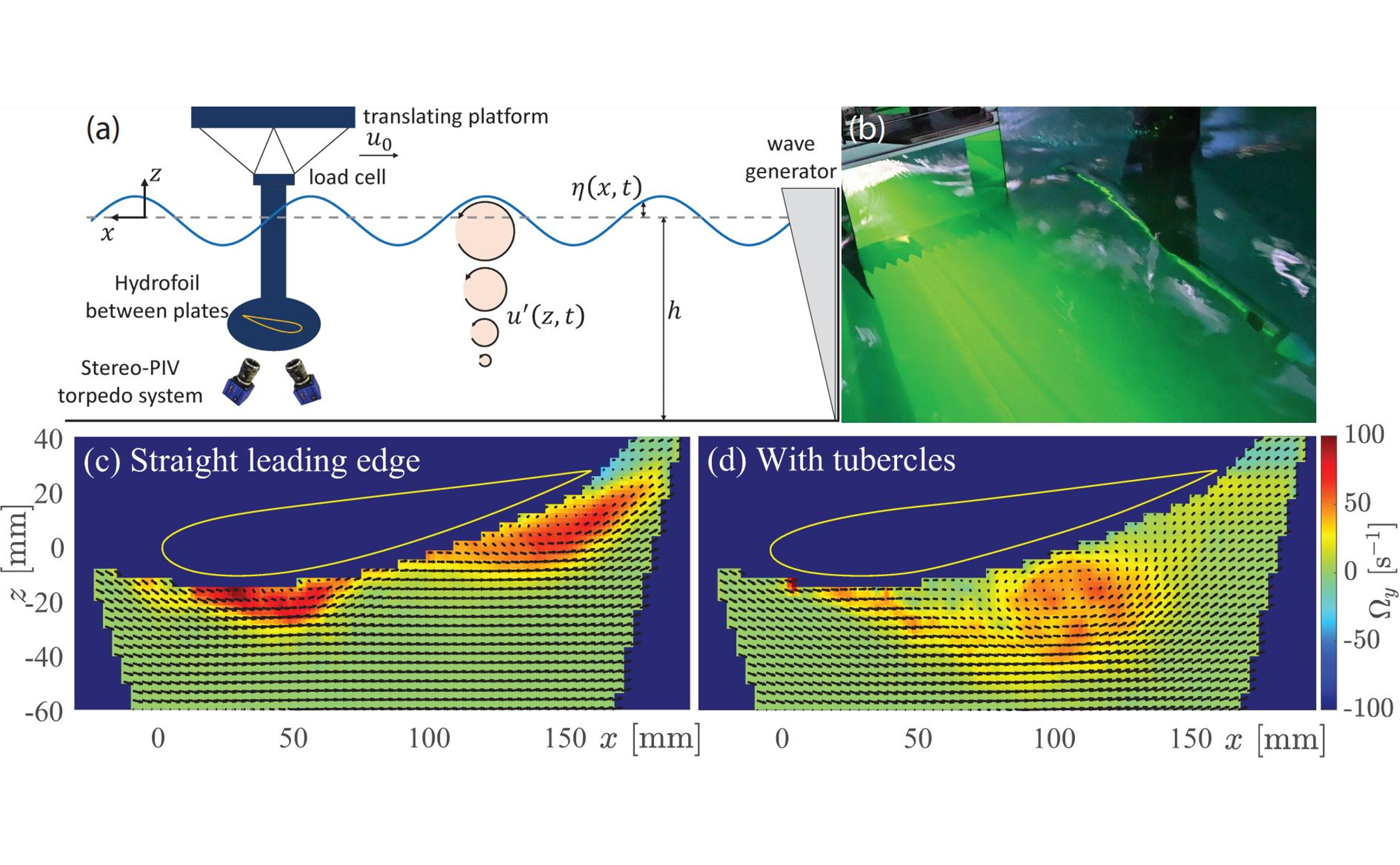
Hydrofoil-Wave Interaction: Physics and Passive Flow Control
Guillaume Ricard
Oceanic and tidal currents are a predictable, high-density source of renewable energy, but harvesting this energy resource is challenging at large water depth. Locating turbine installations closer to the water-air interface would improve accessibility and maintainability. However, close to the surface, gravity waves can cause force variations, efficiency loss and fatigue of hydrokinetic turbines. Understanding to what extent surface waves impact a turbine is essential for predicting turbine performance and modelling fatigue. We present an experimental study of the fundamentals of hydrofoil-wave interaction. This simplified analysis is conducted to explore the evolution of unsteady flow around a foil, interacting with the waves. To do so, we use simultaneously a six-component force balance to measure the forces acting on the foil, and high resolution stereoscopic particle image velocimetry (PIV) to quantify the flow. Strong force fluctuations emerge with the waves and a compact leading edge vortex is observed. Passive flow control is subsequently implemented via application of tubercles to the leading edge of the foil. This geometry is known to modify the foil boundary layer and stall dynamics, but there has been minimal focus on its effect in unsteady flow. Tubercles are found to reduce the force fluctuations experienced under unsteady wave induced flow, which could be beneficial with regard to structural fatigue.
13-02-2025
Mini symposium – Technical talk
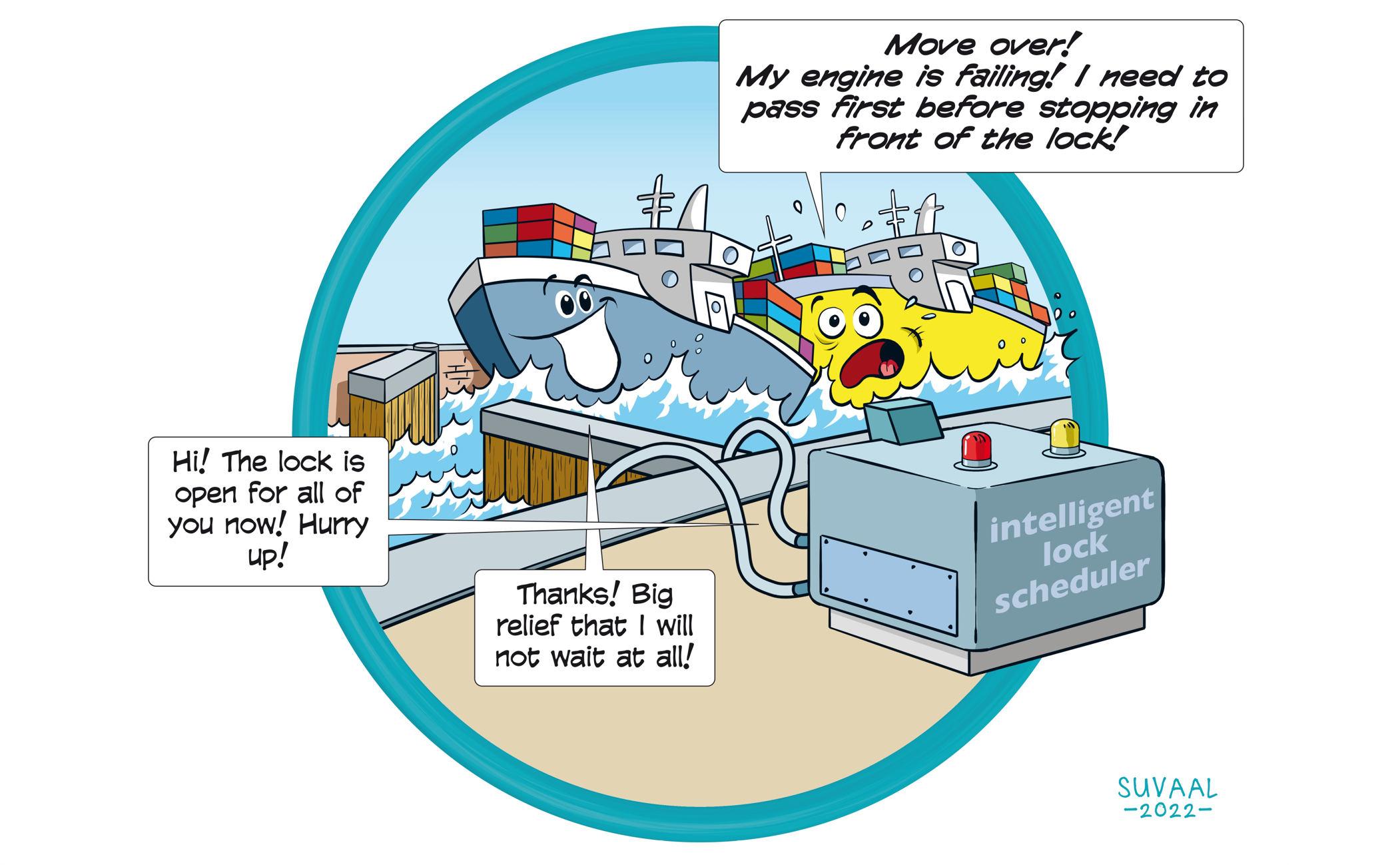
Safe Autonomous Maritime Transport
Vasso Reppa
One of the key priorities of maritime transport is to increase the levels of autonomy of all operations conducted by marine vessels and their cargo handling equipment, as well as onshore, offshore, inland infrastructure. This implies the increase of the number of modern sensors and actuators, information and communication technology and advanced algorithms for monitoring, automatic control, planning, perception etc. The objective of this talk is to discuss how to design autonomous maritime transport operations and systems ensuring safety. We are going to discuss safety challenges posed by the complexity of the systems, the dynamic operational environment, environmental disturbances, and physical and cyber abnormal events (e.g. faults, attacks). If you are interested in this talk, you may also want to visit the SAFE-NET group webpage for more information.
06-02-2025 - Lecture Hall E
PhD presentation
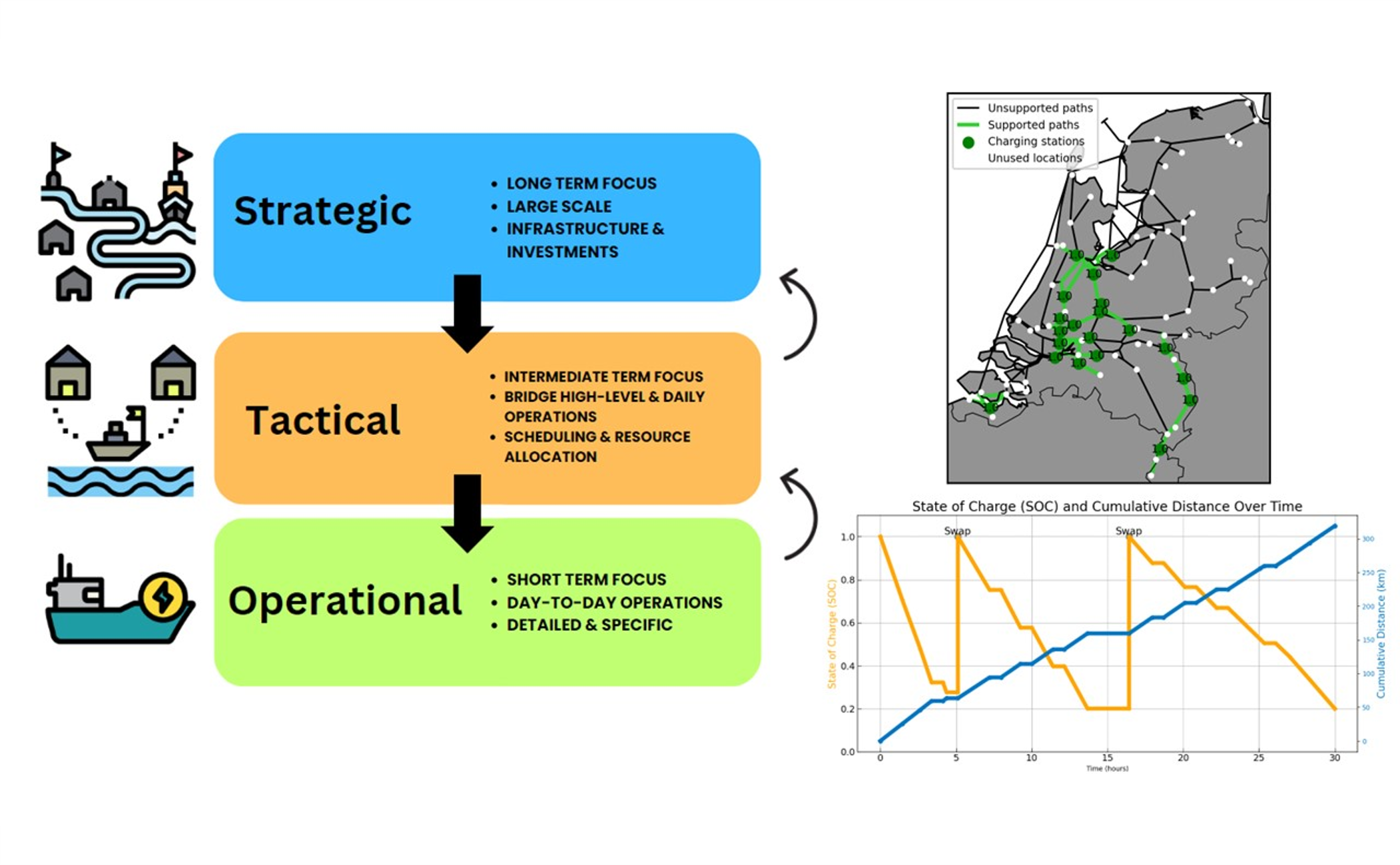
Towards Zero-Emission Inland Waterway Transport: Integrated Approaches for Optimizing Logistics and Energy Systems
Jayvee Ramos
The inland transportation industry is undergoing a transformative shift toward sustainable energy sources. With the integration of alternative zero-emission (ZE) energy, logistical decision-making becomes more complex due to constraints that differ from those of conventional fuels.
My research aims to bridge the gap between technological feasibility and practical implementation by developing decision-support models that optimize logistics and operations for ZE energy adoption. These models address strategic, tactical, and operational decision-making, assisting both energy infrastructure developers and ship operators in transitioning toward sustainable transportation. In this presentation, I will introduce two models that contribute to this goal. The first is a multi-period location model for battery swapping stations, designed to maximize network coverage. The second model focuses on voyage optimization for a containerized battery-powered vessel, aiming to minimize operational costs by identifying the optimal speed, swapping decisions, and onboard battery capacity.
23-01-2025 - Lecture Hall F
PhD presentation
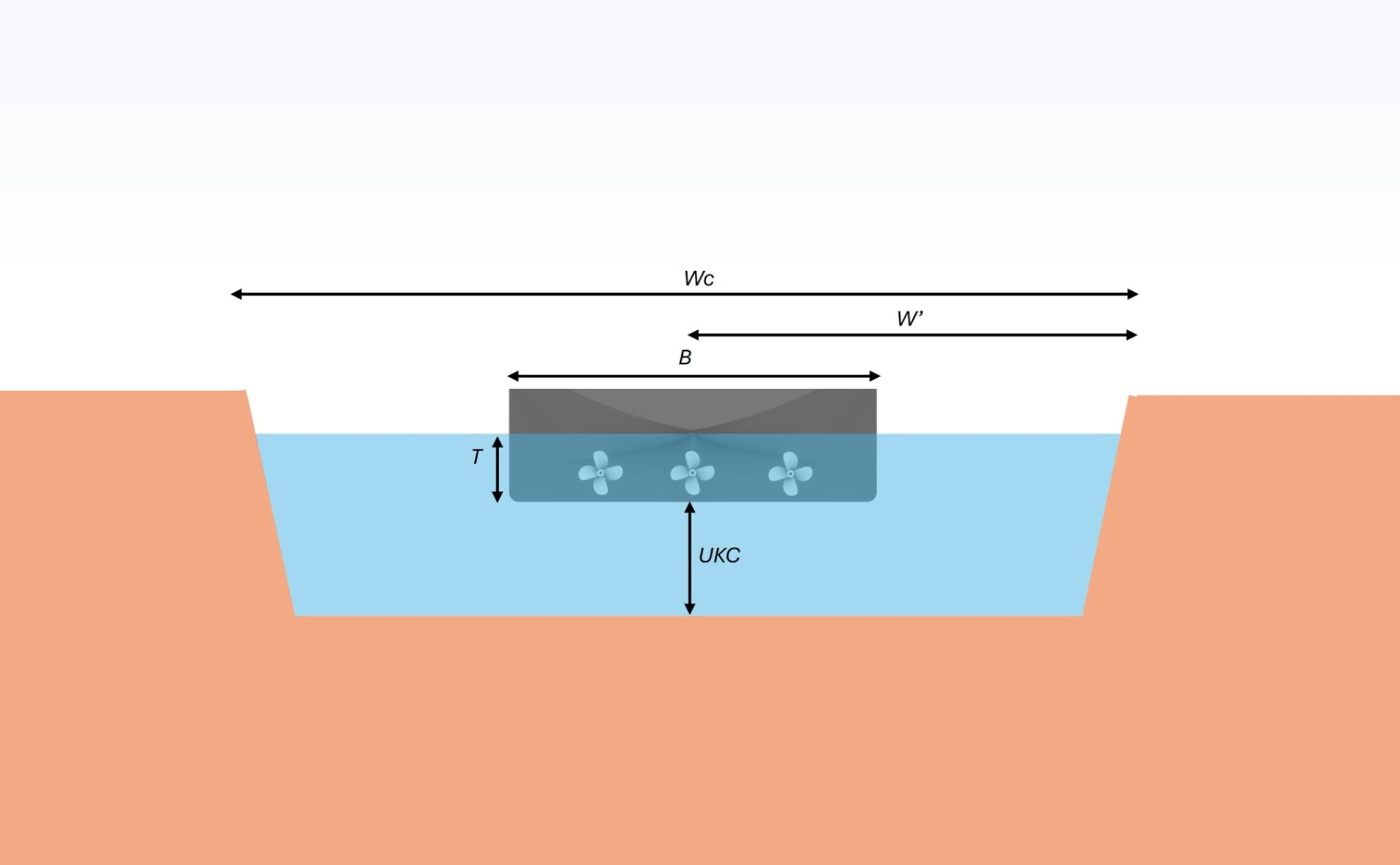
Towards Climate Resilient Inland waterway vessel – concept of distributed propulsion for shallow water conditions.
Richmond Anku
Inland waterway vessels are critical to hinterland transportation network, offering an environmentally friendly alternative to road and rail (freight) transport. However, climate change poses significant challenges, such as extended periods of drought leading to shallow water conditions on the waterways. Adding to the existing fairway characteristics such width restrictions, these conditions increase resistance and reduce propulsive efficiency of inland vessels. This study investigates distributed propulsion systems as a solution for climate-resilient vessel design. The research examines replacing the conventional single large propellers with multiple smaller ones, analysing their advantages in shallow-water operations. Through mathematical modelling and optimization, we determine optimal propeller configurations (size, number, placement) to enhance thrust efficiency and extend navigability in restricted depths. Key benefits include distributed thrust loading, and reduced ventilation risk.
23-01-2025 - Lecture Hall F
PhD presentation
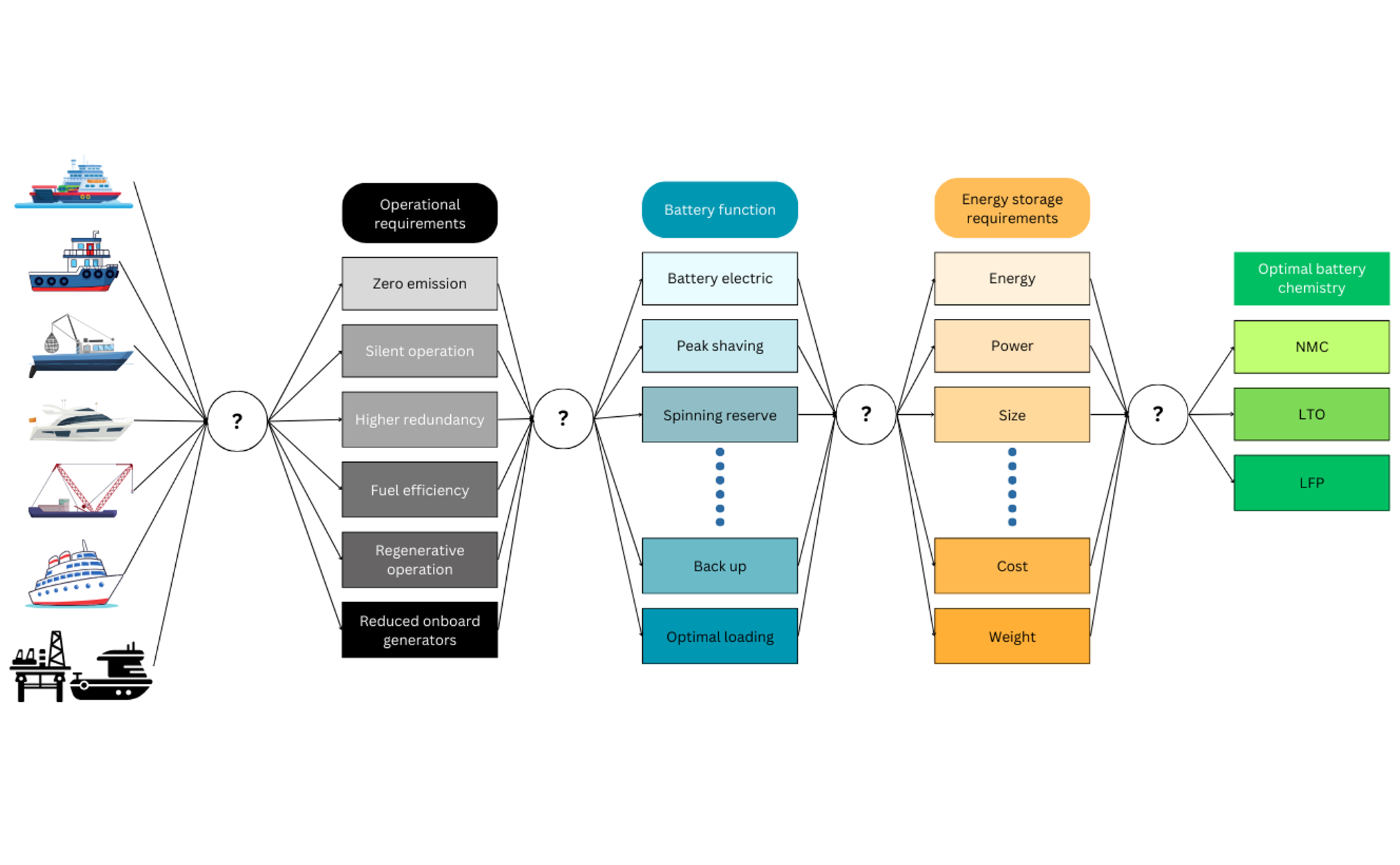
Battery Systems for Maritime Applications
Sankarshan Durgaprasad
The maritime industry is transitioning to cleaner and more efficient energy systems, driven by regulations, advancements in battery technologies, and improved charging infrastructure. Batteries offer significant benefits, categorized into environmental and techno-economic advantages, such as reduced emissions, operational efficiency, and cost savings across various vessel types. This presentation examines 15 distinct battery functions and maps their associated benefits, showcasing their importance in driving the maritime sector toward a greener and more cost-effective future. Additionally, the operational requirements of seven vessel types are analysed through 21 specific needs. A decision tree is presented to guide the selection of suitable lithium-ion chemistries—such as Lithium Iron Phosphate, Nickel Manganese Cobalt, and Lithium Titanate Oxide—based on vessel-specific operational priorities and performance requirements.
16-01-2025 - Lecture Hall E
PhD presentation
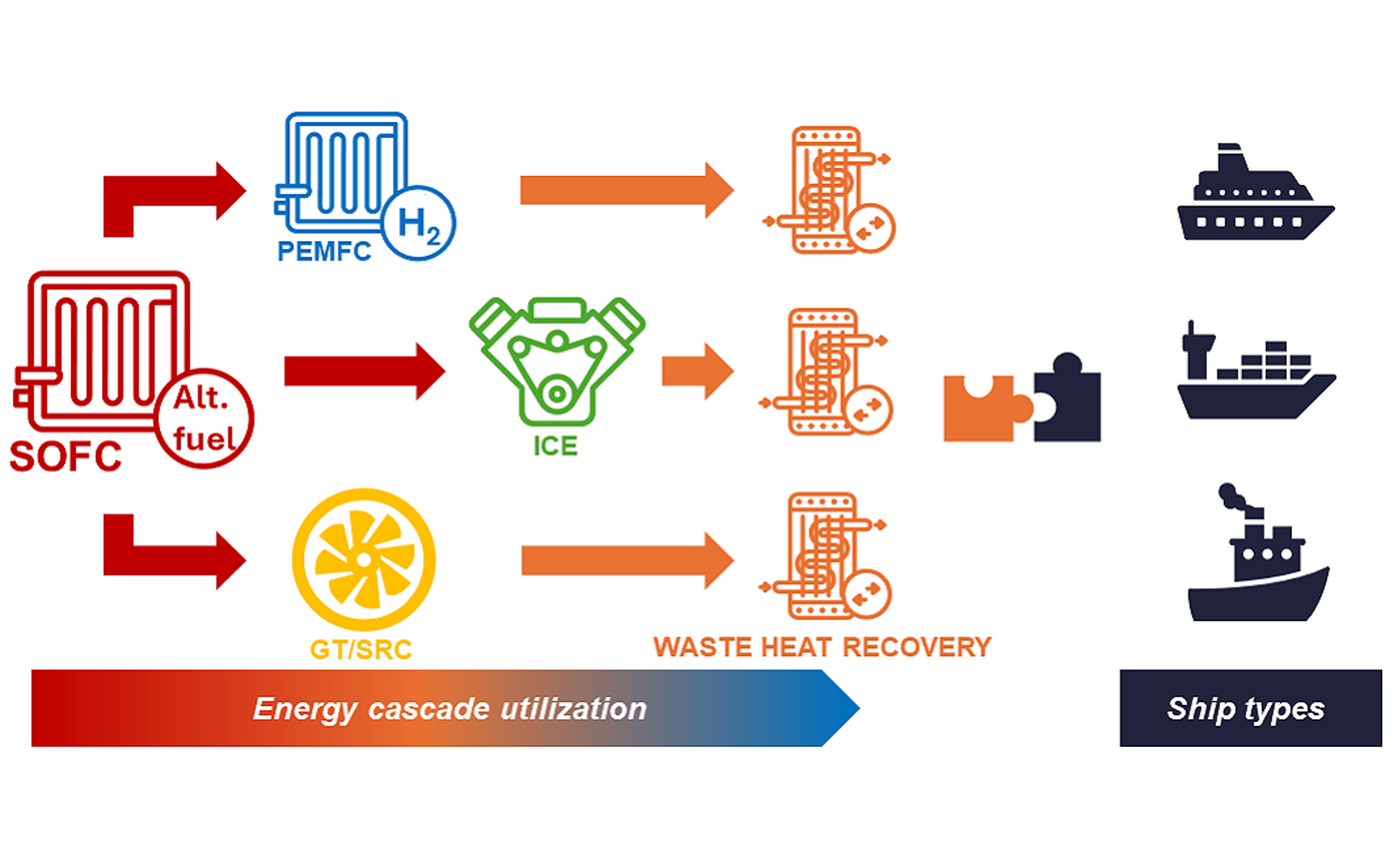
Integration of SOFCs in ship heat and power networks
Niek Goselink
Solid oxide fuel cells (SOFC) are an interesting alternative to conventional power systems onboard ships to reduce greenhouse gas (GHG) emissions. The high operating temperature (in the range of 500-1000 deg C) allows the SOFC to be fuel flexible, it can be operated on a variety of alternative fuels, while it can also be combined with different bottoming cycles, among others a low-temperature proton exchange membrane fuel cell (PEMFC). This talk will reflect on the modelling work done on a combined SOFC+PEMFC system, while it also looks ahead to future work related to heat integration with alternative hydrogen carriers and off-design modelling of SOFC combined cycle systems.
16-01-2025 - Lecture Hall E
PhD presentation
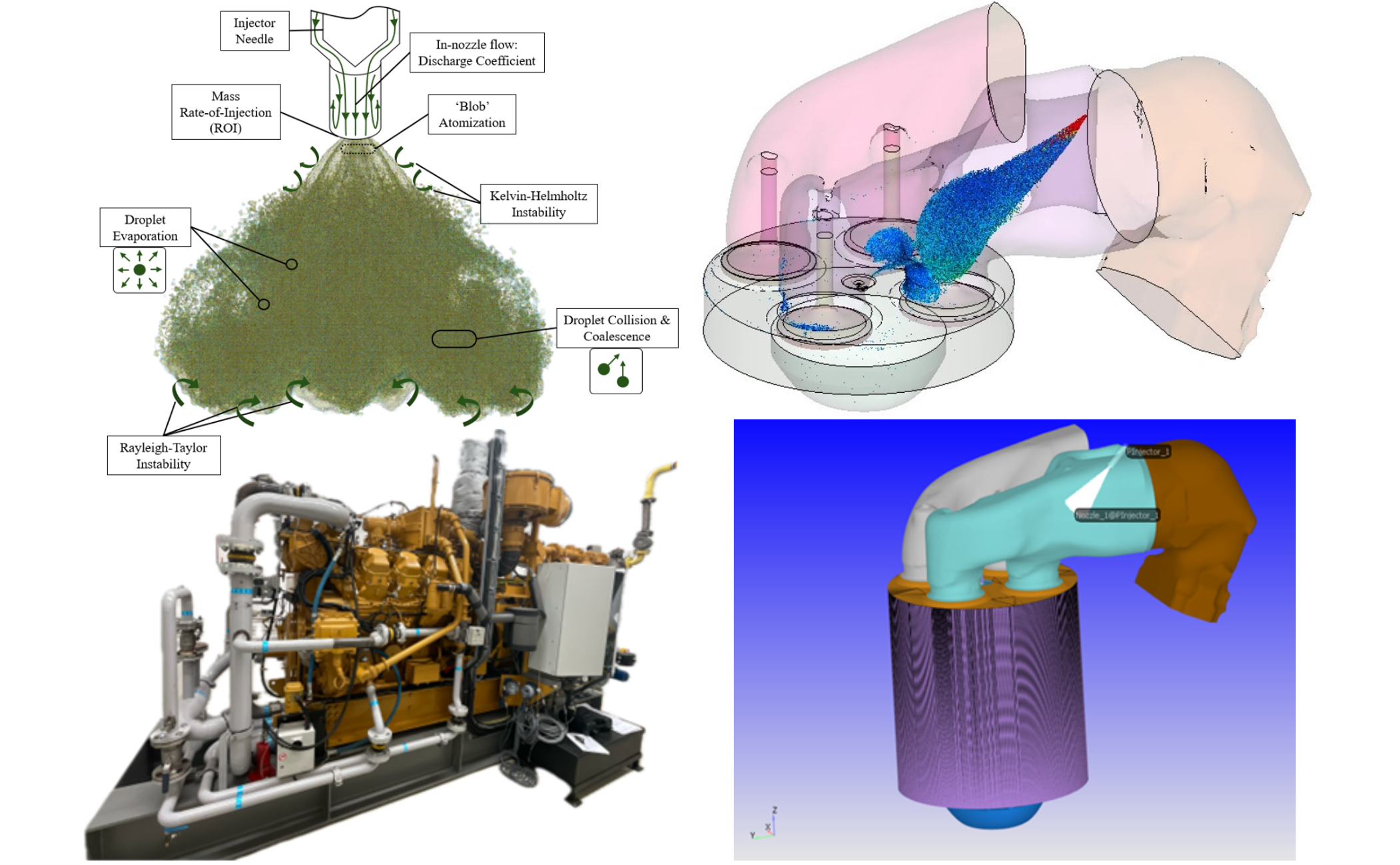
Methanol Sprays in Marine Internal Combustion Engines
Konstantinos Zoumpourlos
Methanol has emerged as a cost-effective and scalable fuel for the maritime sector. However, the use of methanol in marine engines is hindered by the lack of understanding on the mixture formation and combustion processes. This research aims to investigate the characteristics of methanol sprays and their effect on combustion in marine engines. The proposed methodology evaluates the effectiveness of state-of-the-art computational fluid dynamics (CFD) models in simulating port fuel (PF) and direct injection conditions. The CFD models leverage the Lagrangian-Eulerian (LE) coupling method within the Unsteady Reynolds Averaged Navier Stokes (URANS) turbulence framework. Moreover, the predictive capabilities of different spray sub-models are investigated. The intention is to implement these spray sub-models into a validated 3D CFD engine model, demystify methanol combustion, and contribute to the decarbonization of the maritime industry.
09-01-2025 - Lecture Hall B
Social Talk
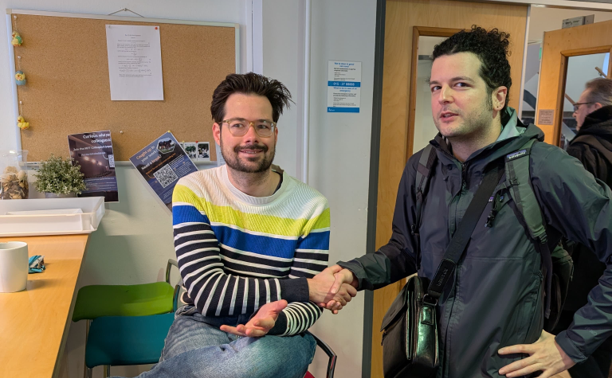
Insights from Insiders: Navigating Early Academia
Apostolos Grammatikopoulos & Bart Scheeren
Apostolos joined TU Delft in 2021 as a postdoc, and in 2023 became an Assistant Professor. Within the Ship and Offshore Structures section (SAOS), he specialises in structural vibration and fluid-structure interaction.
Apostolos once spent 2 months (almost 24/7) 3D printing a model for one of the master’s students he was supervising
Bart joined TU Delft in 2011 as a student, and after a good thirteen years he leaves as a postdoc. He is intending to put his research into practice by spinning off a start-up, to bring the technology for ultrasonic condition monitoring of low-speed roller bearings to the industry.
Since 2019, Bart has an office orchid that has been flowering frequently and is about to bloom one last time in the office
19-12-2024 - Lecture Hall E
PostDoc presentation
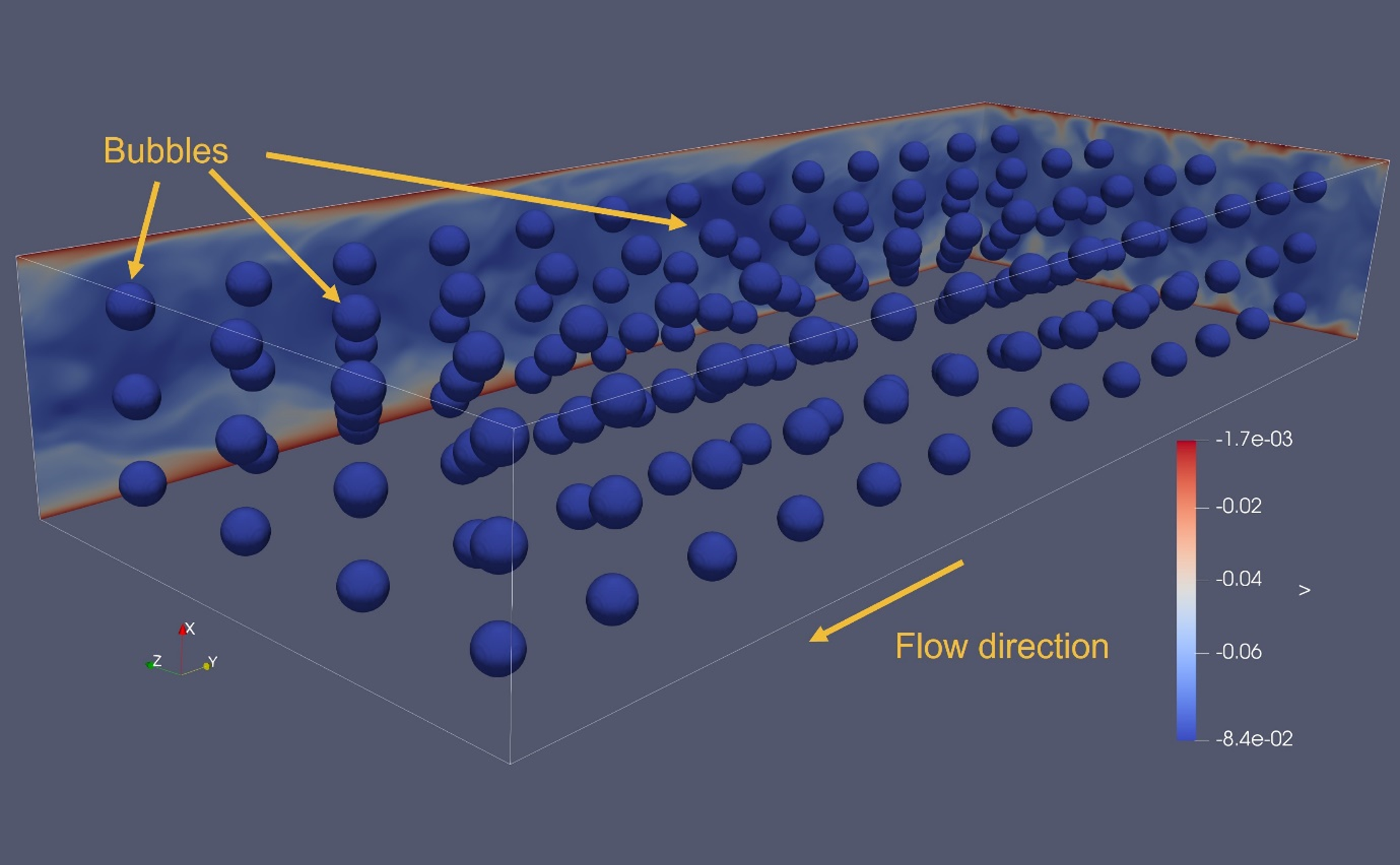
Challenges in High-Fidelity Simulations of Two-Phase Flows Undergoing Phase Change
Jordi Poblador Ibanez
Multiphase flows undergoing phase change are present in many engineering applications. In particular, they play an important role in the energy transition landscape. Some examples include the injection of biofuels, the boiling of coolants in heat exchangers, or the formation of bubbles in water electrolysis. A common approach to study numerically these systems is based on the one-fluid formulation of the Navier-Stokes equations, which treats the phase discontinuity as a single fluid with varying properties and adds additional source terms to impose interfacial jump conditions, e.g., surface tension. Many legacy codes used to study non-evaporative conditions have been extended to phase-change simulations. However, the numerical discretization of the one-fluid governing equations under such conditions introduces errors that must be corrected to ensure the physical consistency of the results..
19-12-2024 - Lecture Hall E
PostDoc presentation
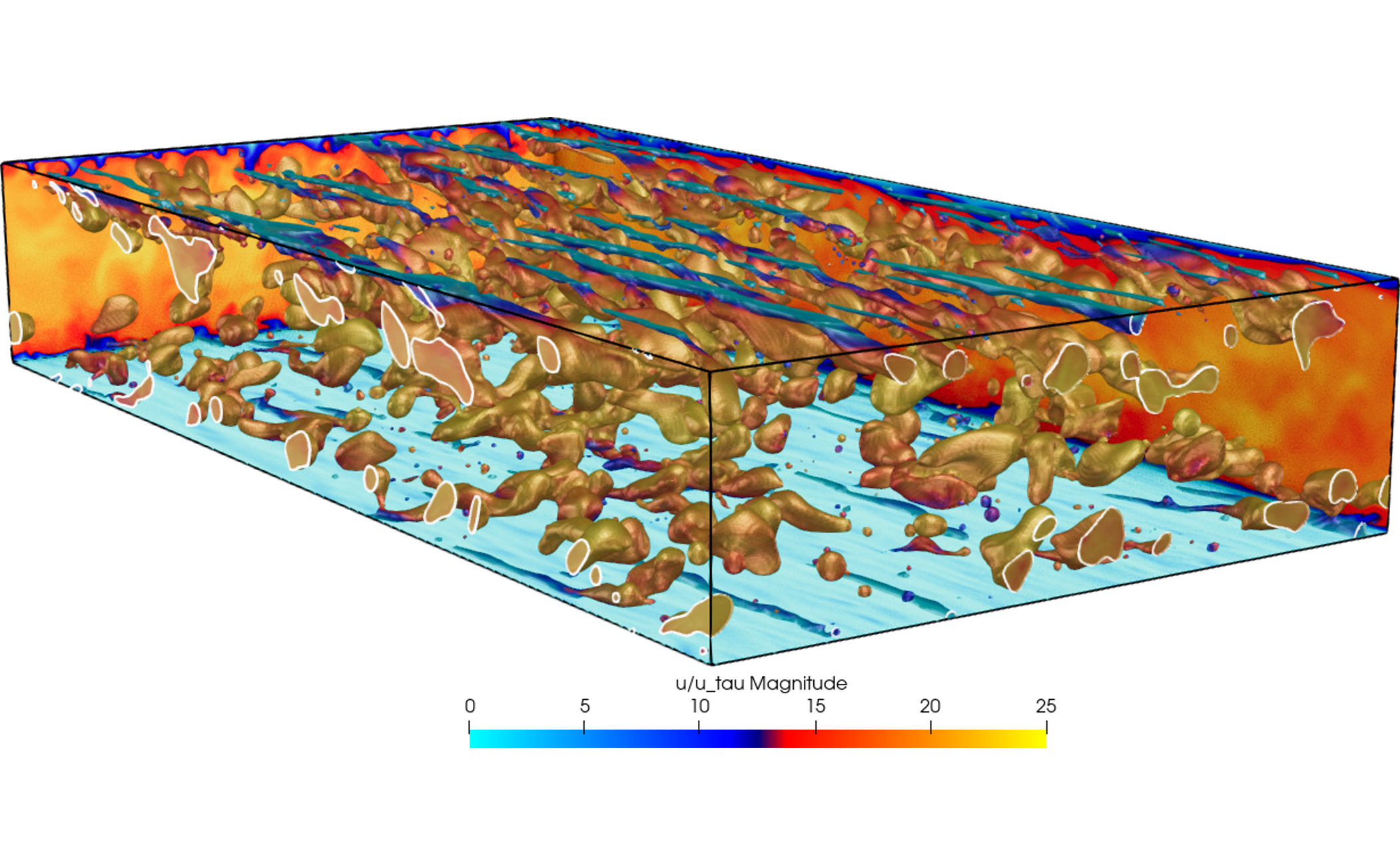
CaNS-Fizzy. A GPU-accelerated solver for two-phase turbulent flows
Giandomenico Lupo
Direct Numerical Simulations of two-phase flows with high levels of interface dispersion, such as bubble or droplet-laden turbulent flows, remain computationally expensive due to the high-resolution requirement imposed throughout the whole computational domain by the direct solution of the interface morphology and of the transport at the interface scale. The finite different solver CaNS-Fizzy has been developed to enable these simulations by exploiting the computational capacity of modern GPU clusters. The key features that keep the computational cost affordable are the one-fluid formulation of the two-phase flow, the use of a fast direct solver for the pressure Poisson equation, and the diffuse representation of the phase interface. The latter allows for continuous and smooth mapping of the physical fields and requires no explicit interface reconstruction, keeping the computational load constant regardless of the local interface topology and thus making the algorithm particularly suited for parallelization on GPU architecture.
05-12-2024 - Lecture Hall E
PhD presentation
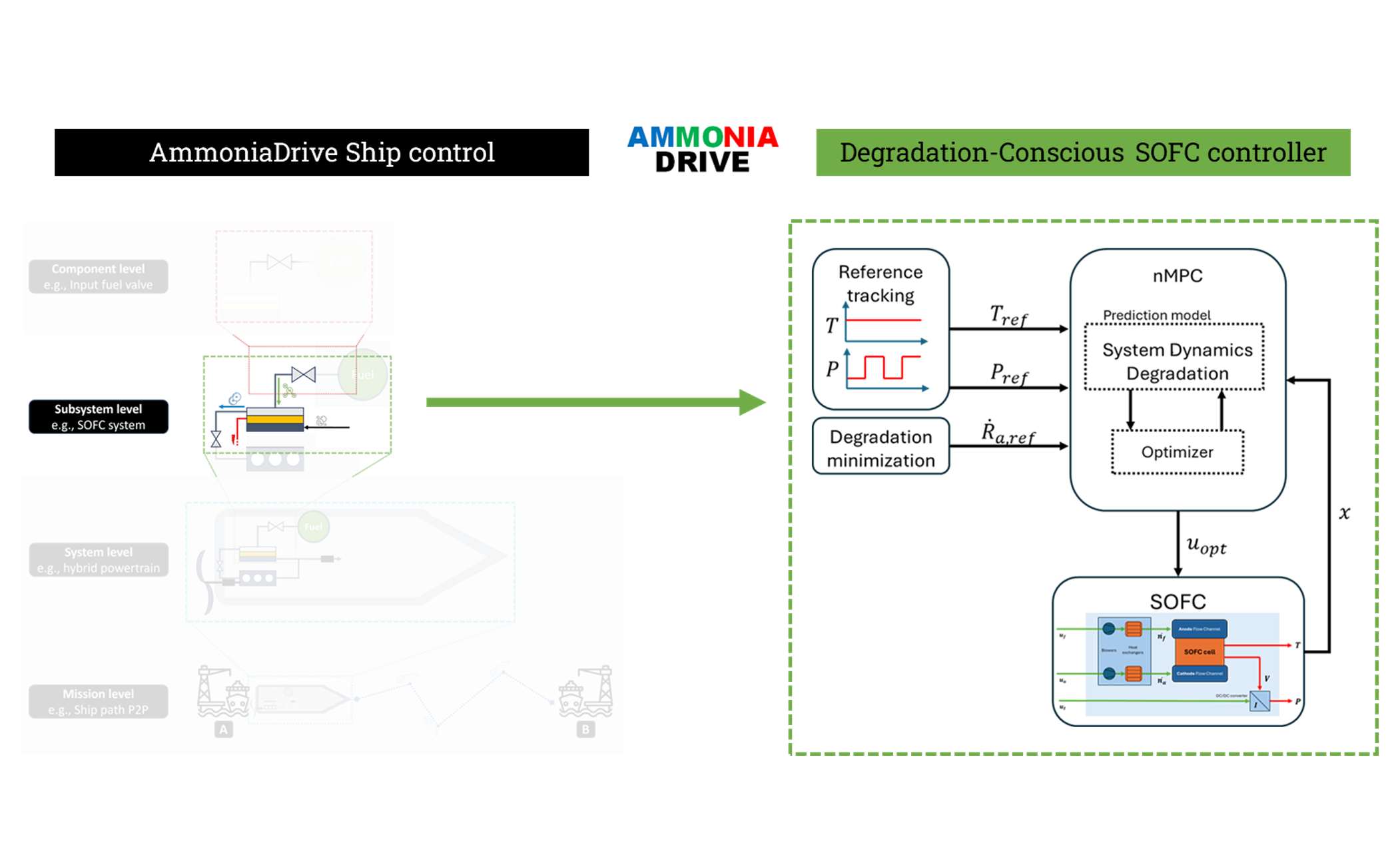
Degradation-Conscious Model predictive Control For Marine Solid Oxide Fuel Cells
Andrea Caspani
The AmmoniaDrive project investigates the adoption of ammonia fueled hybrid powertrains for cargo vessels, based on the combination of Solid Oxide Fuel Cells (SOFCs) and internal combustion engines technology. SOFCs represent a promising technology in electric power generation, especially for alternative fuels and large-scale applications. However, their widespread adoption still requires improved reliability, particularly in addressing cell degradation, which directly affects its functional lifetime.
This presentation introduces a Degradation-Conscious control strategy for SOFCs, which combines the information of the dynamical and of the degradation models of the cell to meet power demand while reducing cell’s deterioration throught time. The approach involves a new state space model that integrates a reduced-order SOFC dynamics model with a voltage degradation model, which are inserted in a Nonlinear Model Predictive Control framework. Simulation results demonstrate the effectiveness of this strategy in reducing degradation while maintaining the required dynamic performance.
05-12-2024 - Lecture Hall E
PhD presentation
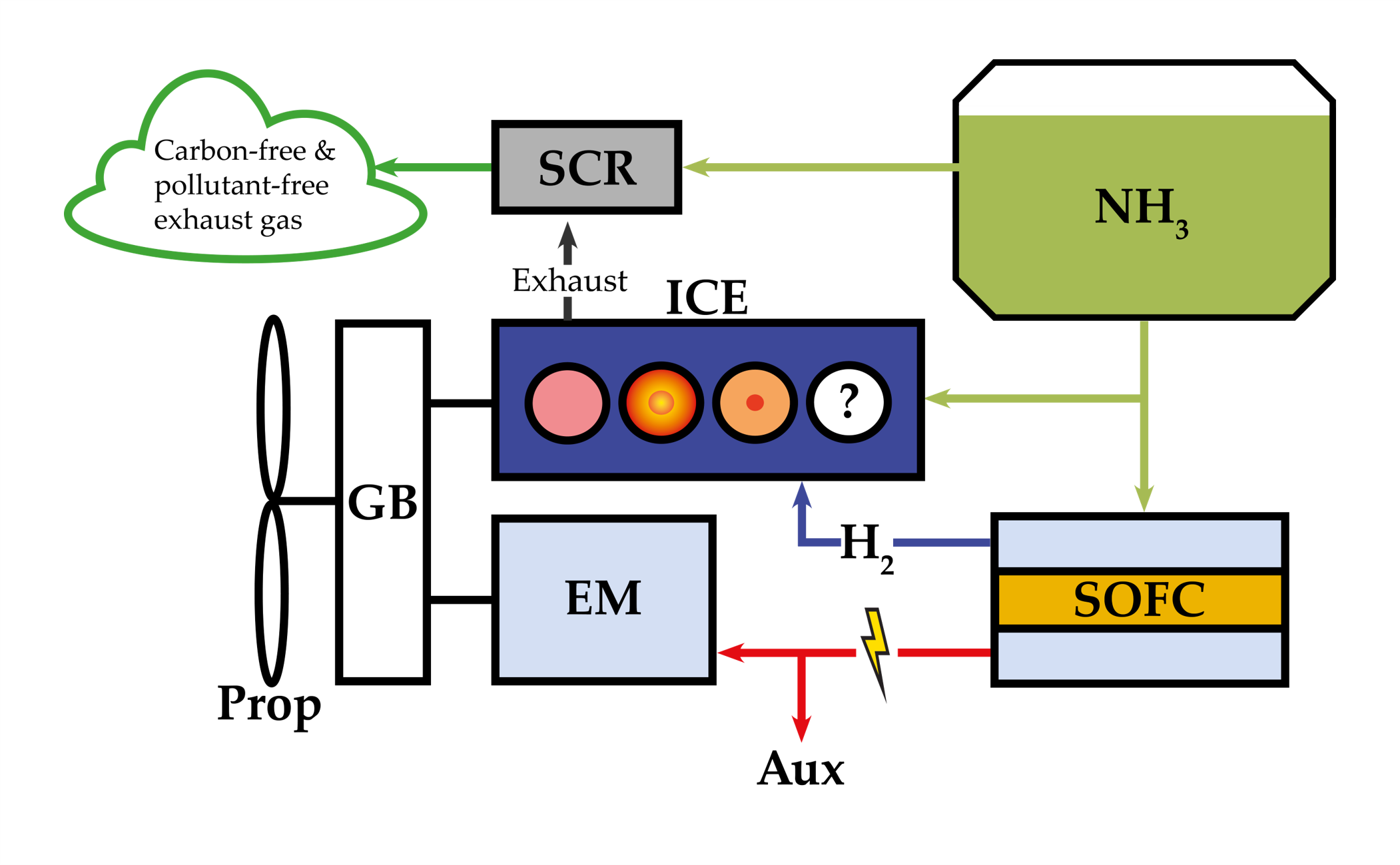
Ammonia-hydrogen as fuel for internal combustion engines
Isabelle Jacobs
My research is part of the AmmoniaDrive project, which investigates an ammonia-fueled power plant concept consisting of a solid oxide fuel cell (SOFC) and a reciprocating internal combustion engine (ICE).
My research puzzle piece within this project is the in-cylinder combustion of ammonia-hydrogen (NH3-H2). In this presentation, I will provide an overview of combustion properties, in-cylinder combustion strategies and the process of developing a model with predictive capabilities while limiting the computational costs.
21-11-2024 - Lecture Hall E
PhD presentation
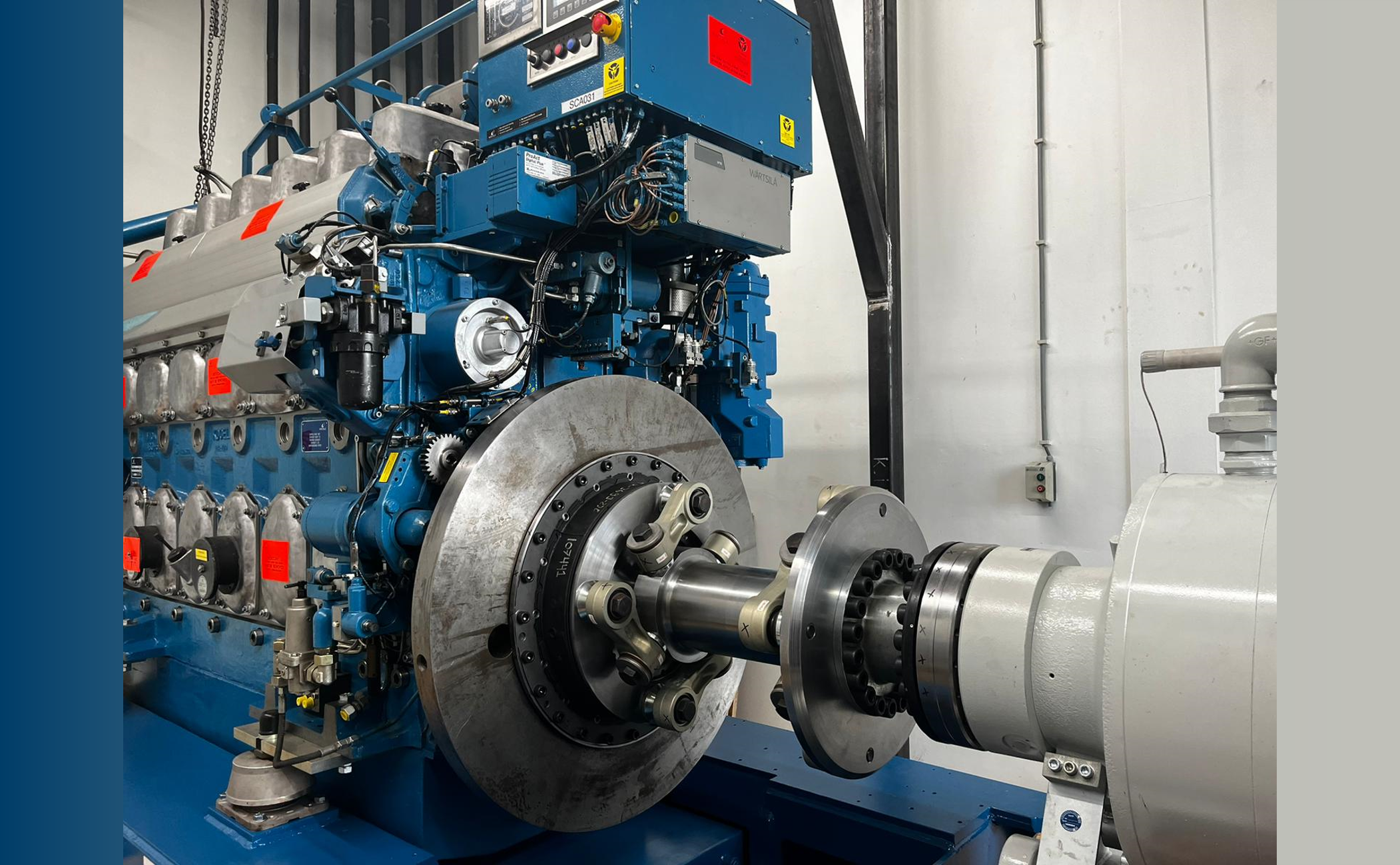
Predictive Maintenance of Marine Diesel Engines: Integrating In-Cylinder Pressure Measurements, Machine Learning, and First-Principles Models
Youri Linden
This study addresses the pressing need for advanced maintenance strategies to enhance operational readiness of critical assets, particularly Marine Diesel Engines in naval vessels. Against a backdrop of heightened geopolitical tensions and increased defense budgets, optimizing maintenance through data-driven and condition-based approaches has become essential. The research focuses on leveraging advanced condition monitoring techniques, such as in-cylinder pressure measurements, to detect early signs of engine degradation. A key objective is to adapt these methods to real-world operational settings characterized by noisy, incomplete data and environmental variability. By bridging gaps in existing literature, the study aims to develop hybrid models integrating machine learning and physical principles for real-time fault detection and degradation prediction. With access to both controlled experimental and operational naval data, this work seeks to deliver robust, practical solutions, enhancing the predictive maintenance capabilities essential for naval operational efficiency and asset reliability.
21-11-2024 - Lecture Hall E
PhD presentation
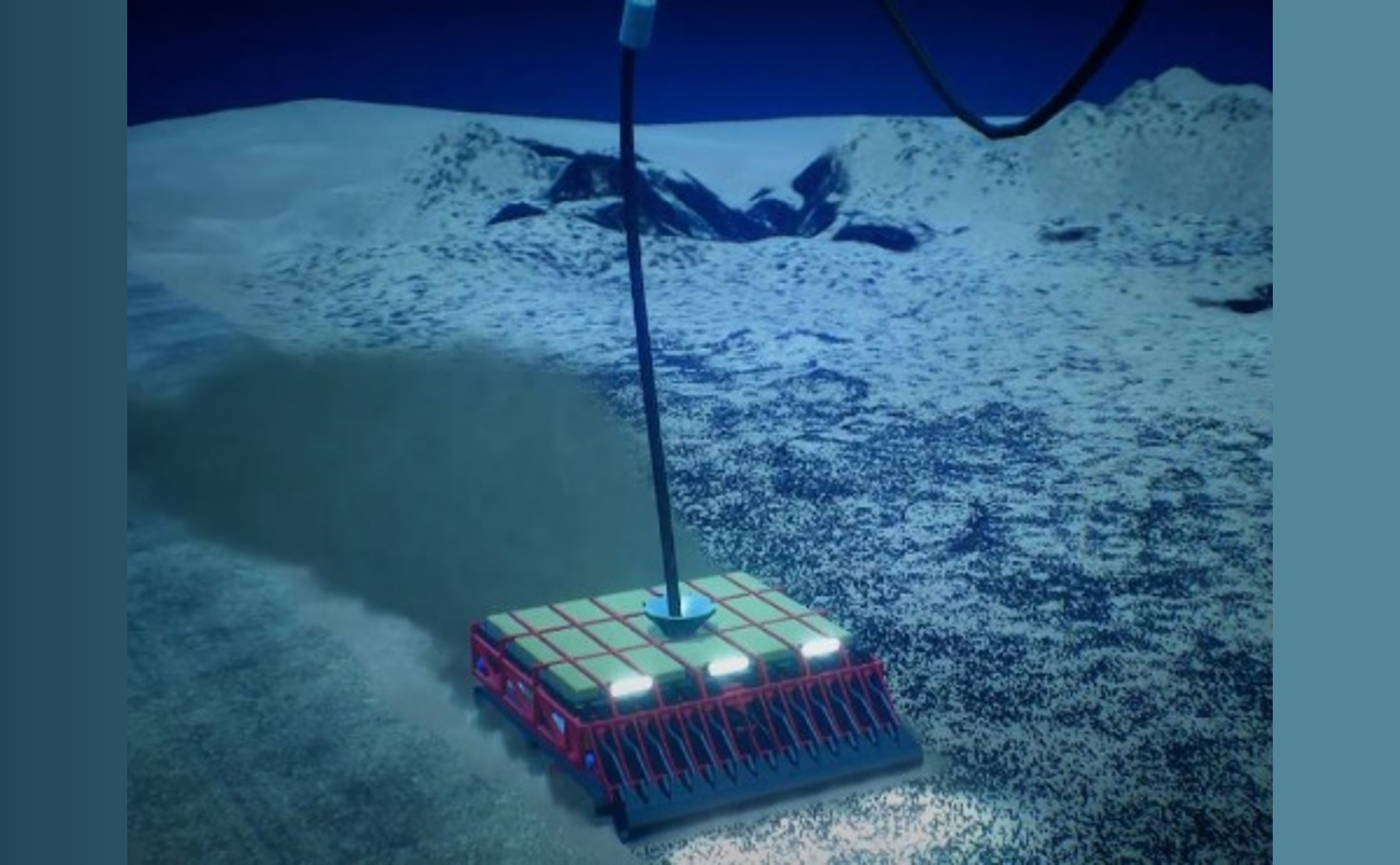
Deep sea mining turbidity current dispersion on a slope
Shaheen Wahab
The global transition to clean energy technologies, critical for achieving a low-carbon future, intensifies the demand for essential raw materials such as nickel, cobalt, and rare earth metals. Land-based mining faces challenges like ore grade depletion and environmental concerns, prompting exploration of alternative sources like deep-sea mining (DSM). DSM, particularly in regions like the Clarion-Clipperton Zone (CCZ), offers access to critical metals in polymetallic nodules but raises environmental concerns, notably sediment plumes that threaten deep-sea ecosystems. This research investigates the near-field dispersion dynamics of turbidity currents from DSM activities, focusing on slope angle and velocity effects. Experiments conducted in TU Delft’s Offshore and Dredging Laboratory used a flume tank setup, simulating turbidity currents with glass beads as sediment. Various measurement techniques such as Acoustic Doppler velocimeters, ultrasonic velocity profilers, and multi-angle cameras revealed that steeper slopes and higher velocity ratios increased sediment bulge formation and dispersion. Downhill experiments exhibited wider dispersion angles with higher velocity ratios, while uphill conditions showed inverse trends. Findings emphasize slope angle and discharge velocity as key factors influencing sediment plume behaviour.
07-11-2024 - Lecture Hall F
PhD presentation
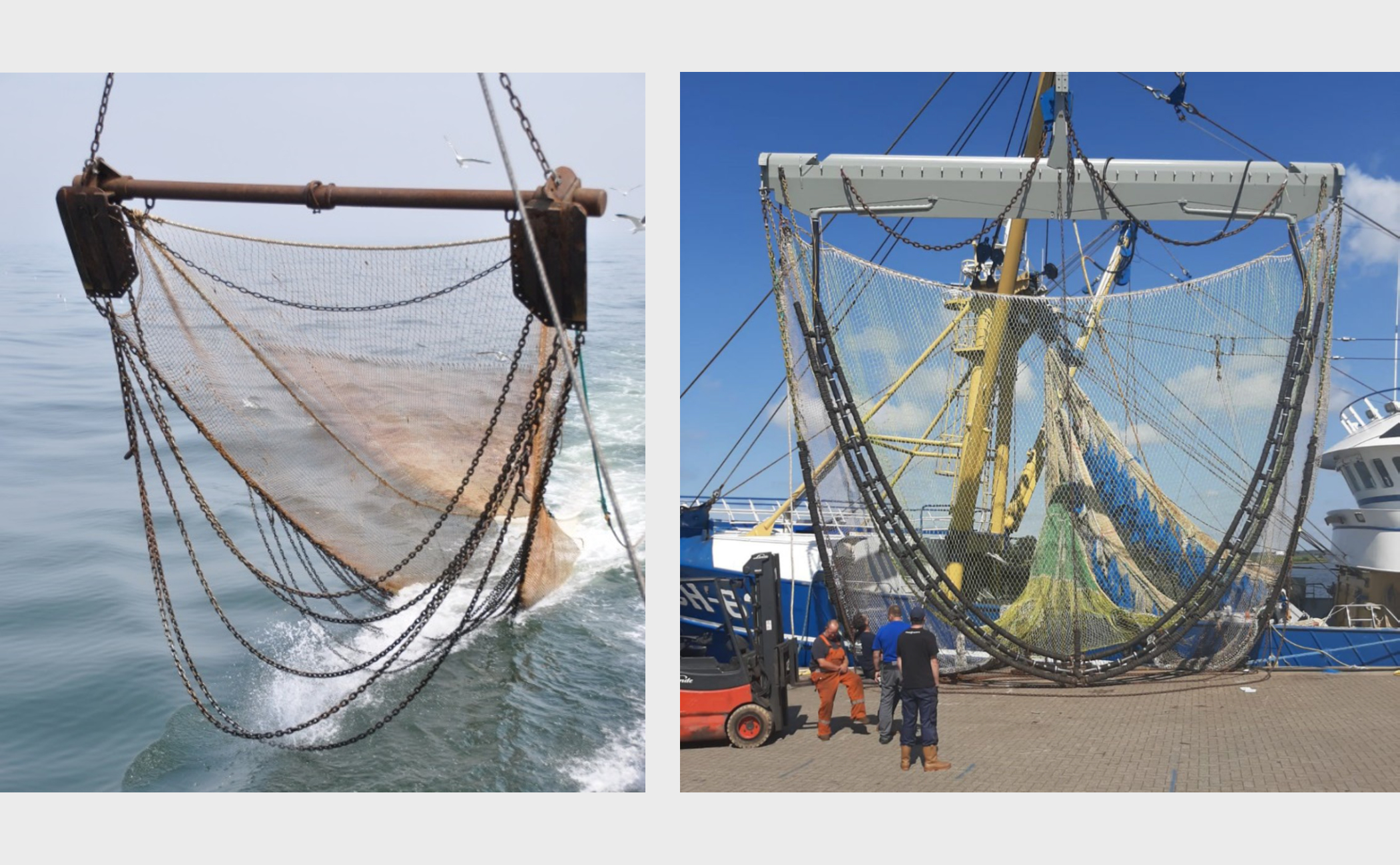
The Potential of Water Jet Stimulation for Flatfish Trawling
Sterre Bult
Commercial demersal trawl fisheries are a large source of physical disturbance to marine habitats. The tickler chain beam trawl causes large bed disturbances, in addition to high fuel costs owing to high drag forces and a low catch efficiency and selectivity. The objective of this research is therefore to develop a new catching technique without electrical stimuli for sole and plaice that minimizes the bed disturbance and increases the catch efficiency. The project is a collaboration between Wageningen University & Research (WUR) and Delft University of Technology (TUD), with the aim to combine the insights on the avoidance behaviour of flatfish and the impact of various stimuli on the seabed for the design of the new catching technique. At TUD, the bed disturbance as a result of various mechanical and hydrodynamical stimuli will be quantified. The focus will be on the effect of hydraulic stimuli on the seabed, more specifically water jets. I will combine small-scale laboratory experiments and computational fluid dynamics modelling to optimize the bed disturbance, while applying sufficient stimulus to initiate a startle response in flatfish. In this talk, I will discuss preliminary experimental and numerical results, as well as our objectives for the coming years.
07-11-2024 - Lecture Hall F
PhD presentation
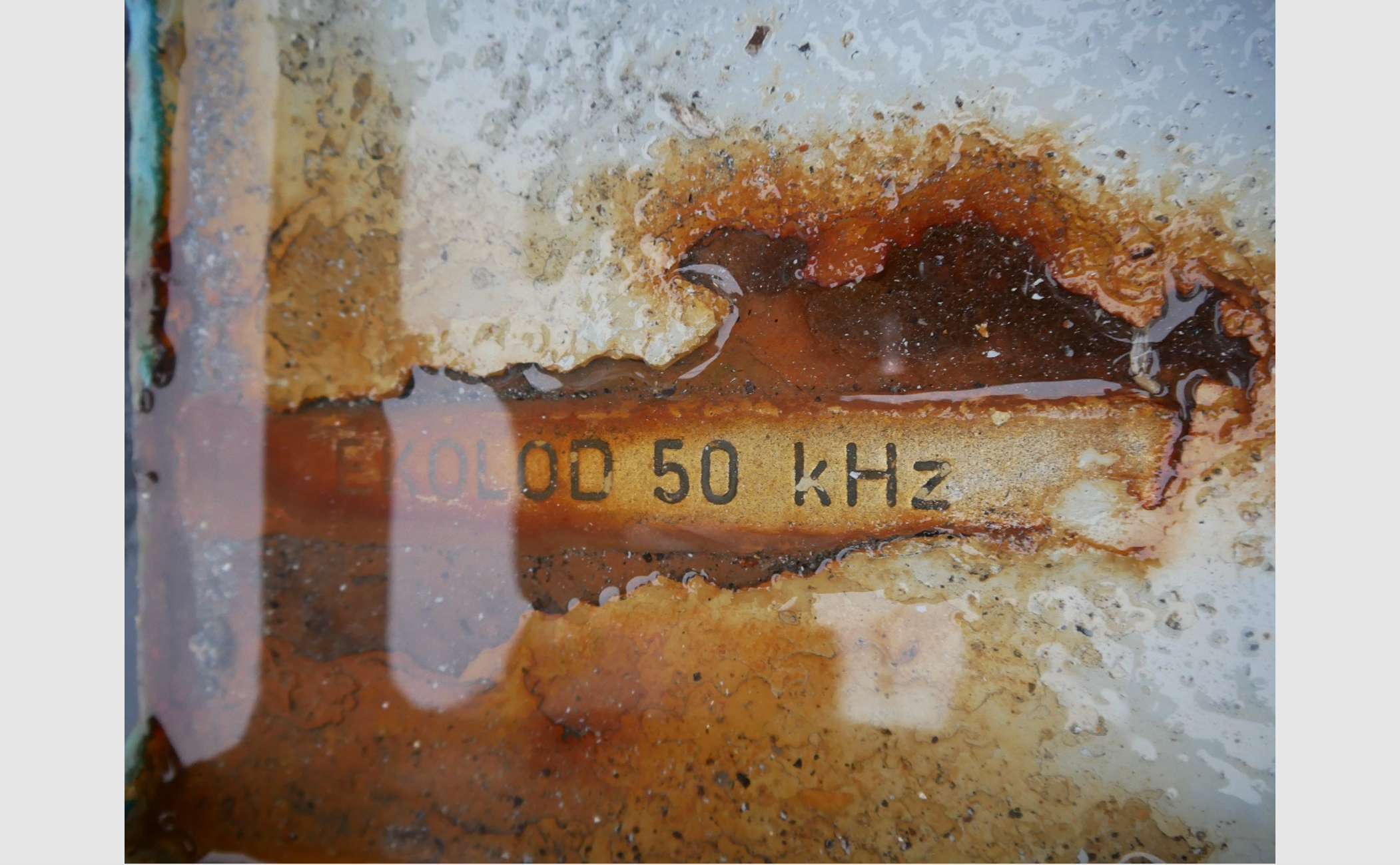
Acoustic emission monitoring of corrosion damage in marine structures
Romain Habiyaremye
Corrosion is amongst the main driving damage mechanisms for the degradation of marine assets. For ships, periodic inspections every five years in a dry dock are mandated by classification societies in order to prevent failures. These surveys are costly and leave the ship non-operational for an extended period of time. Corrosion damage can develop in crevices, under aged coatings, and in hard-to-reach places for traditional inspection methods. Complementary to these inspections, recently, the implementation of real-time inspection methods, so-called structural health monitoring systems (SHM) are becoming more prevalent. Acoustic emission (AE) monitoring is a SHM technique that consists in measuring elastic stress waves caused by a rapid release of energy when irreversible changes occur in a material. When these stress waves occur in thin-walled structures, such as ship hulls, these AE signals can travel over relatively large distances, making it possible to monitor large structures with a relatively low number of sensors. This presentation elaborates on the application of AE monitoring for corrosion detection, the challenges facing this technique, and how my research approaches some of these challenges.
31-10-2024 - Lecture Hall F
PhD presentation
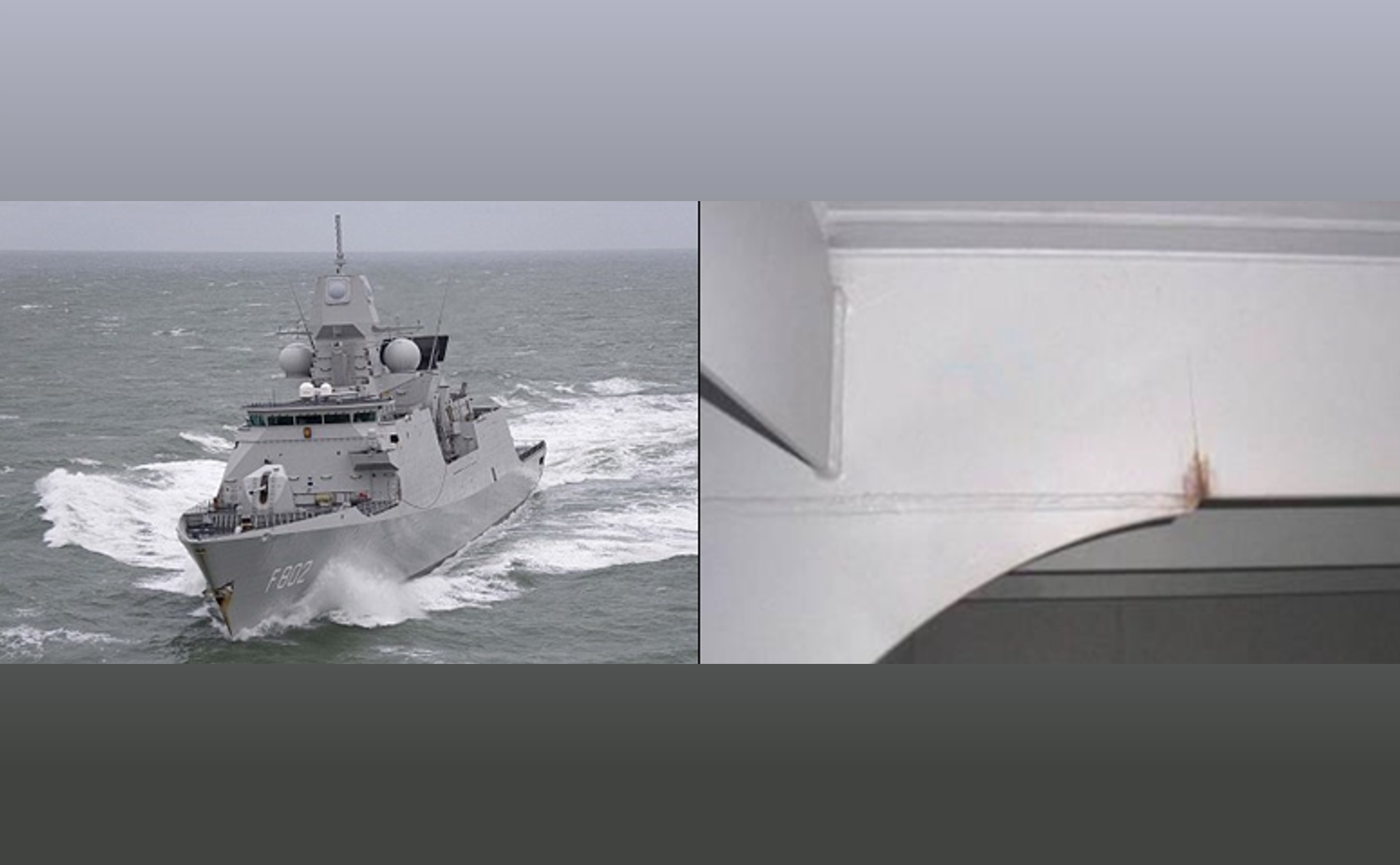
Fatigue Data FUSION: Advancing Lifetime Prediction Models Toward a Unified Resistance Curve
Ruben Slange
Accurate fatigue life assessment is essential for extending the operational life of maritime structures, particularly for fatigue-sensitive details like welded joints. Compared to current practice, improvements can be made regarding the uncertainty of the estimation by incorporating a more advanced Fatigue strength parameter. The parameter includes more information about the stress state, resulting in similarity between different joints, allowing for a unified mid to high-cycle resistance curve for constant amplitude (CA) loading. In this talk, I will discuss how this resistance curve is obtained and how a design curve can be derived.
Extending our aim to variable amplitude (VA) loading conditions introduces the need for a damage accumulation model. The aim is to advance the typically adopted linear damage accumulation model and combine it with the effective notch stress as the fatigue strength criterion and a resistance curve formulation containing a fatigue limit. This will allow exploring the similarities between CA and VA resistance.
In the introduced accumulation model, resistance-induced damage non-linearities are accounted for, decreasing the fatigue limit for accumulating damage. Adopting a random damage resistance description and damage evolution exponent, the model can implicitly reflect sequence effects for different loading spectra, with damage accumulation behaviour ranging from concave upwards to downwards, implying an accelerating and decelerating damage accumulation process. This presentation will discuss preliminary results from this model and ongoing efforts to refine these methods for application in structural health monitoring and fatigue life prediction.
31-10-2024 - Lecture Hall F
PhD presentation
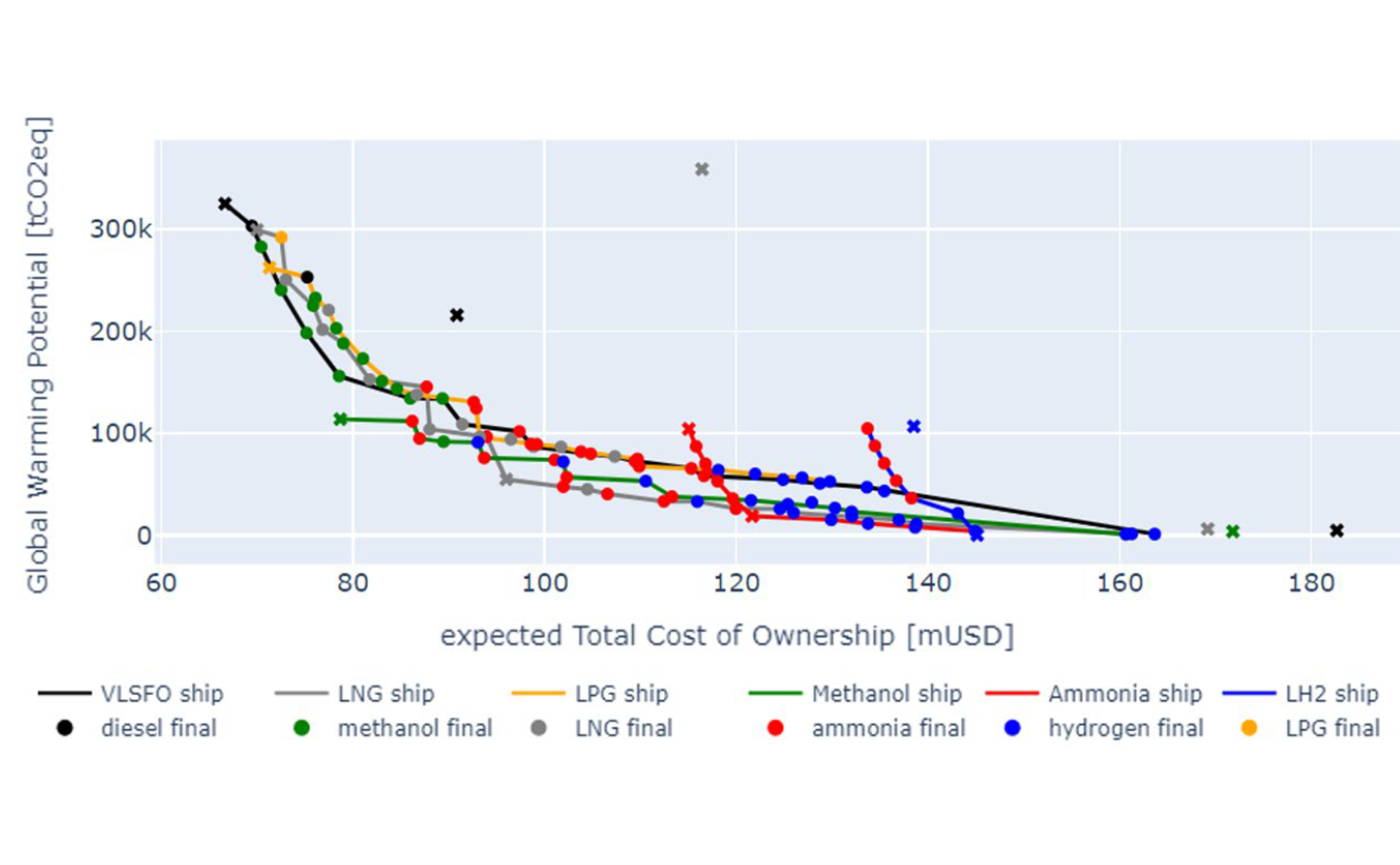
Navigating the maritime energy transition: preparing for tomorrows challenges
Jesper Zwaginga
The maritime industry is under increasing pressure to adopt effective emission reduction measures in response to global targets and the drive for sustainability. However, several challenges complicate decision-making, including: the industry's global nature, economic barriers, the diversity and complexity of vessel types, long asset lifespans, and uncertainties surrounding future regulations and technological development.
This presentation covers decision-making while facing such multi-challenge problems and how these can be addressed. It focuses on three core aspects of my research. First, I present a decision-making framework based on a literature review that guides decision-makers in identifying and categorising key challenges and determining suitable approaches. Second, decision-making over the lifecycle of a fixed or fuel-flexible ship design is explored in response to uncertainties like expected fuel prices and carbon taxation. Finally, I discuss my research into the practical implications of a “changeable” ship design and show an example of preparing a ship design for methanol conversion, illustrating how decisions made today can support tomorrows goals.
17-10-2024 - Lagerhuysch
PostDoc presentation
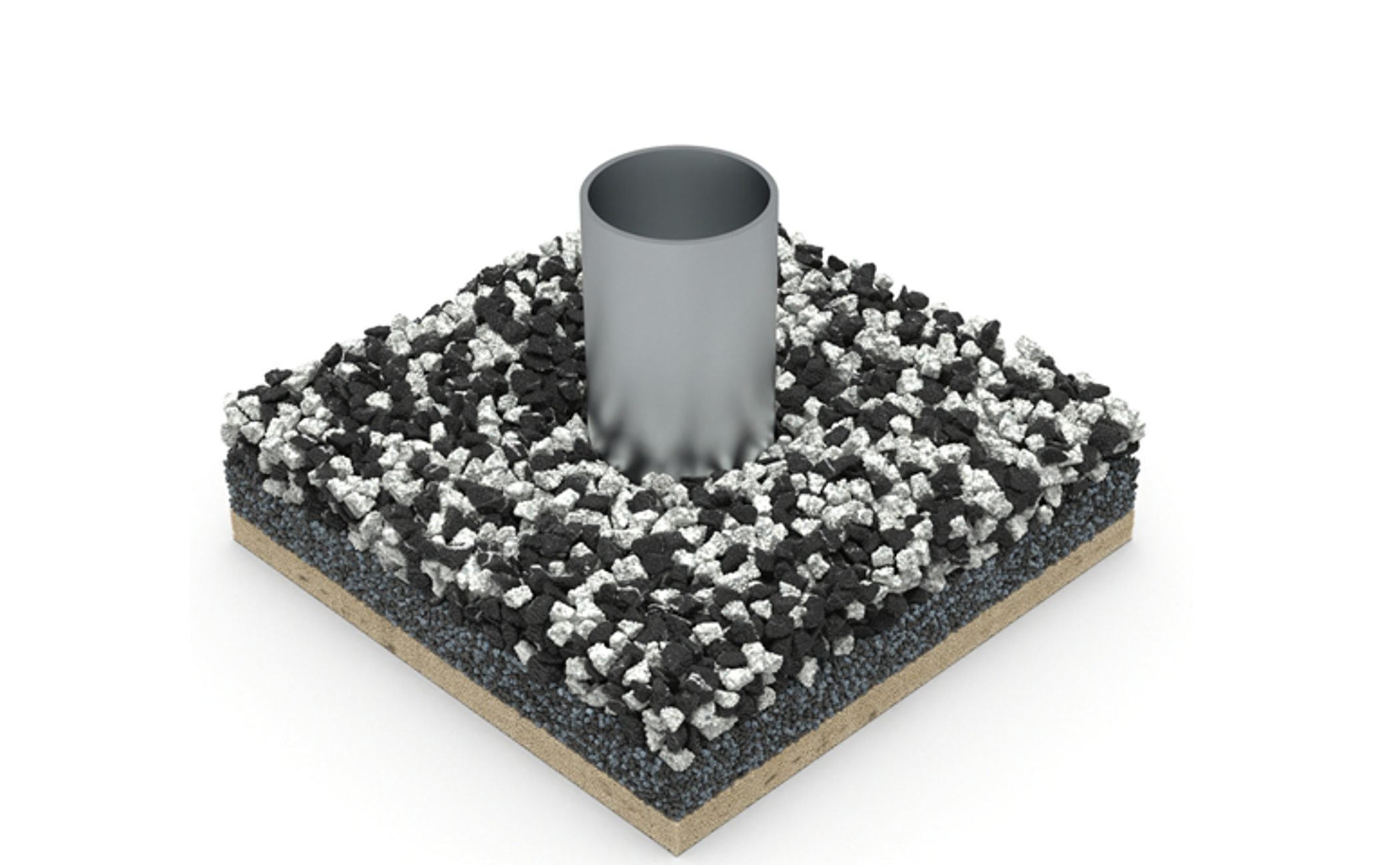
A validated DEM modelling framework on plate and pile penetrations in a double-layer scour protection
Hao Shi
Monopiles are the dominant foundation type for offshore wind turbines, accounting for approximately 80% of the installed capacity. Installing offshore monopile foundations requires monopiles to penetrate several pre-installed scour protection rock layers before securing them into the seabed. With the increasing power of the wind turbines, both the size of the monopile and the scour protection rocks increase. The accurate prediction of the penetration resistance is crucial to ensure successful monopile installations. To facilitate or even replace the costly and labour-intensive experimental small-scale penetration tests, a numerical model has been developed using the Discrete Element Method (DEM) that captures the discrete nature of interactions between rocks and piles and predicts the resistance during the penetration process. The developed DEM model includes armour and filter rocks represented by multispheres and sand particles by spheres. A multistage calibration, verification and validation DEM modelling framework is proposed and examined with small-scale penetration tests conducted using plates and piles in a bilayer scour protection configuration. The sand material model is calibrated and verified using penetrometer tests and the rock material models are calibrated and verified using a plate penetration test. The verified model predicts the penetration resistance well in small-scale pile penetration tests and proves the validity of the proposed framework. The proposed framework facilitates the modelling area where traditional continuum-based numerical methods give less accurate predictions and allow us to achieve further insights that are hardly or nearly impossible to obtain by experiments.
17-10-2024 - Lagerhuysch
PostDoc presentation
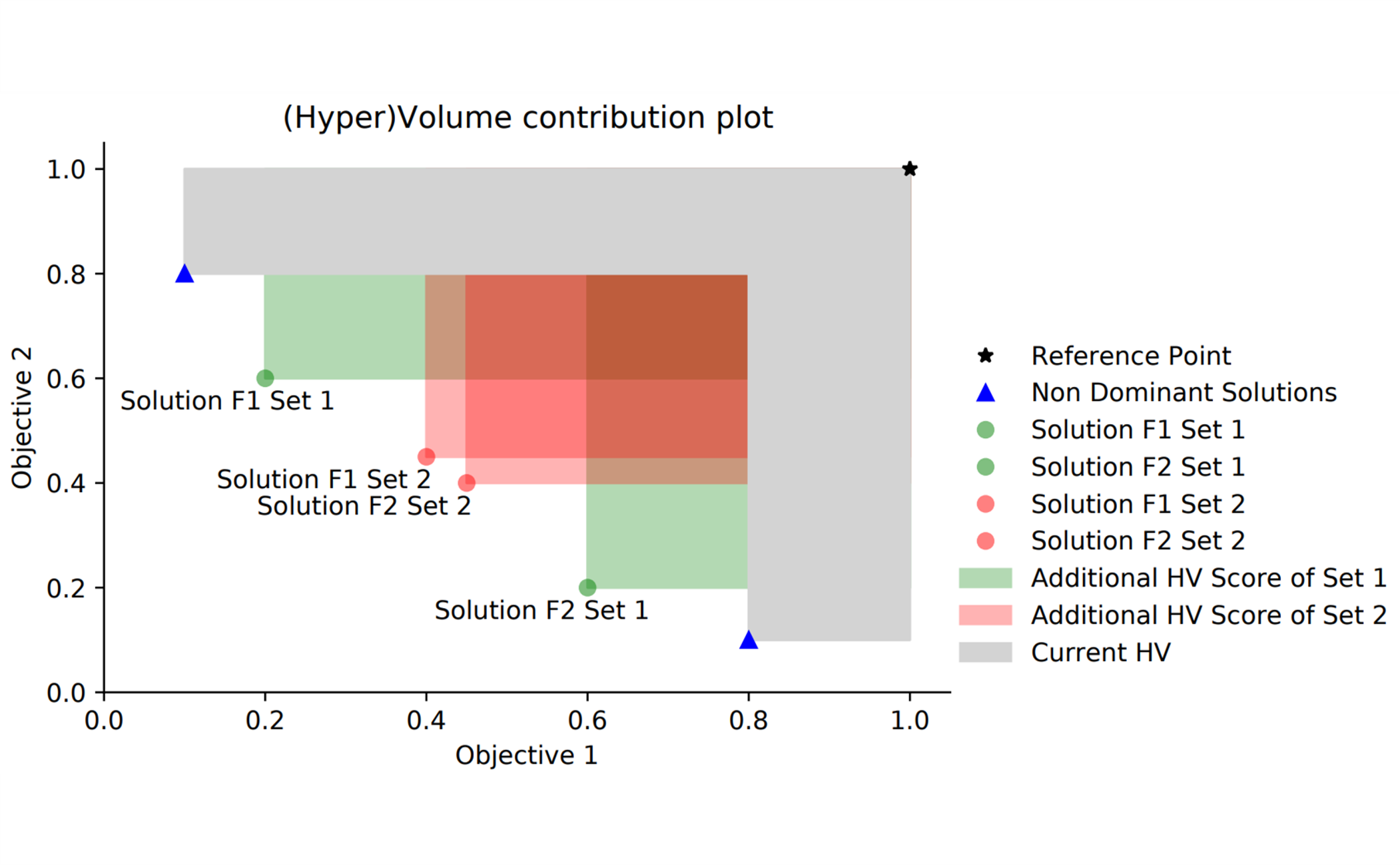
Efficient Constraint Multi-Objective Optimization with Applications in Ship Design
Roy de Winter
In this talk I will introduce the work that I conducted during my PhD at C-Job Naval Architects and the Natural Computing group of Leiden University. The main contribution of my thesis are efficient multi-objective optimization algorithms that can also handle constraints. I worked on and discovered several different strategies that speed up the optimization process despite the expensive nature of the objective and constraint functions. The algorithm that I will introduce in this talk is the IOC-SAMO-COBRA algorithm that has been used to optimize the damage stability criteria and the cargo hold volume of a single hold cargo ship by adjusting the bulkhead positions. The IOC-SAMO-COBRA algorithm incorporates all the techniques and recommendations discovered during my PhD, which include: 1) Use an as small as possible initial design of experiments for faster convergence, 2) Adaptively chose the best surrogate fit, 3) The use of uncertainty quantification methodologies is redundant when doing multi-objective optimization, 4) I t is possible to propose multiple solutions per iteration by using the hypervolume performance indicator, and finally 5) Combining inexpensive constraint and objective functions with surrogate models for expensive functions leads to better Pareto frontier approximations.
03-10-2024 - Lecture Hall A
PhD presentation
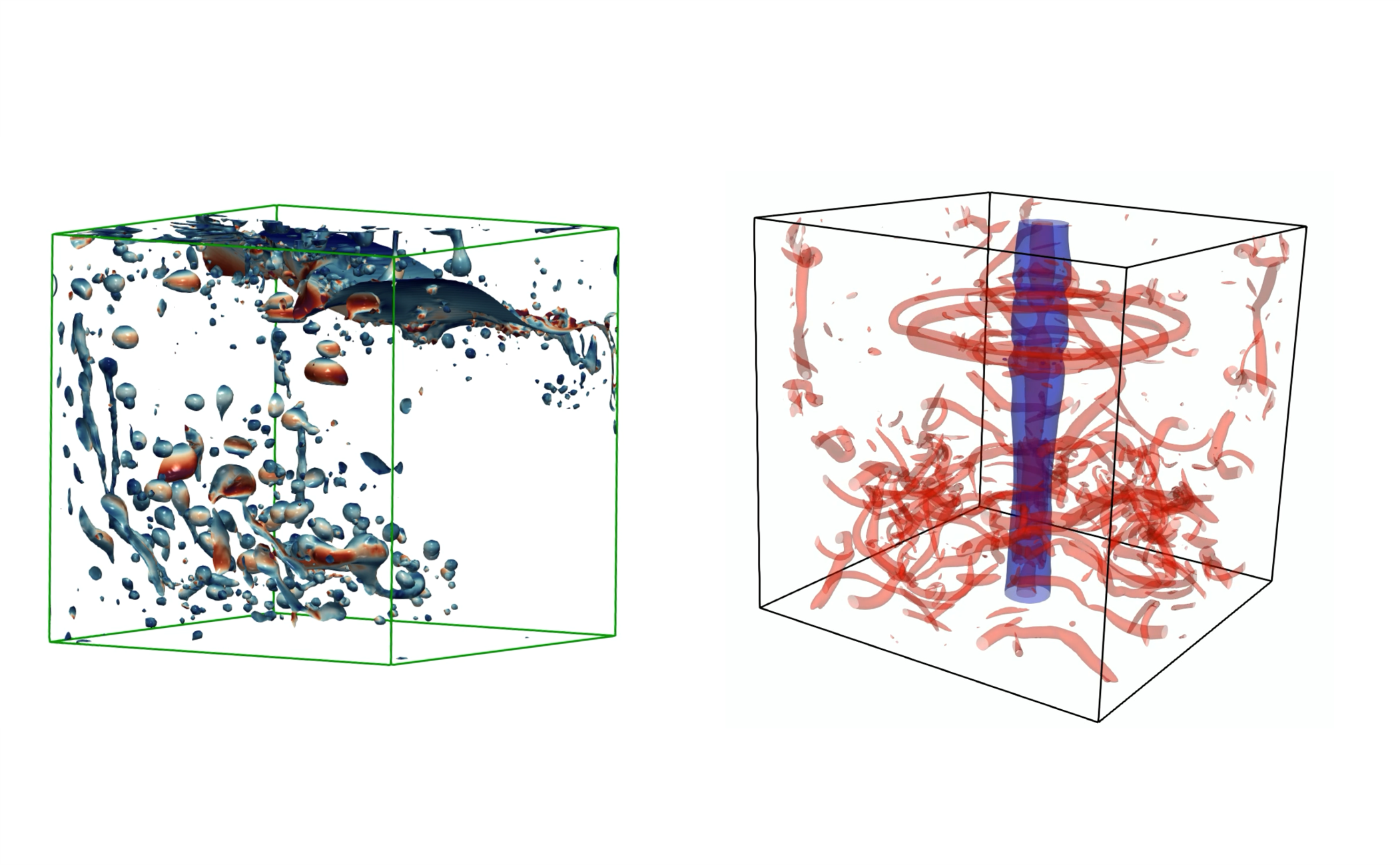
Towards sub-grid scale bubble modeling and Characterizing numerical artifacts in multiphase simulation
Tzu-Yao Huang
Simulating bubbly flows is challenging, particularly at high Reynolds (Re) and Weber (We) numbers, where bubble sizes vary significantly. Direct numerical simulation (DNS) is computationally infeasible for high-momentum cases like those induced by Olympic divers. To address this, we aim to develop a sub-grid scale (SGS) bubble model that ensures coarse grid solutions align with real-world data. Along the way, we identified an intriguing numerical artifact in sharp interface simulations, which we call ‘numerical shape diffusion.’ This presentation will cover our progress toward creating an SGS bubble model and our insights into these numerical artifacts in multiphase simulations.
03-10-2024 - Lecture Hall A
PhD presentation
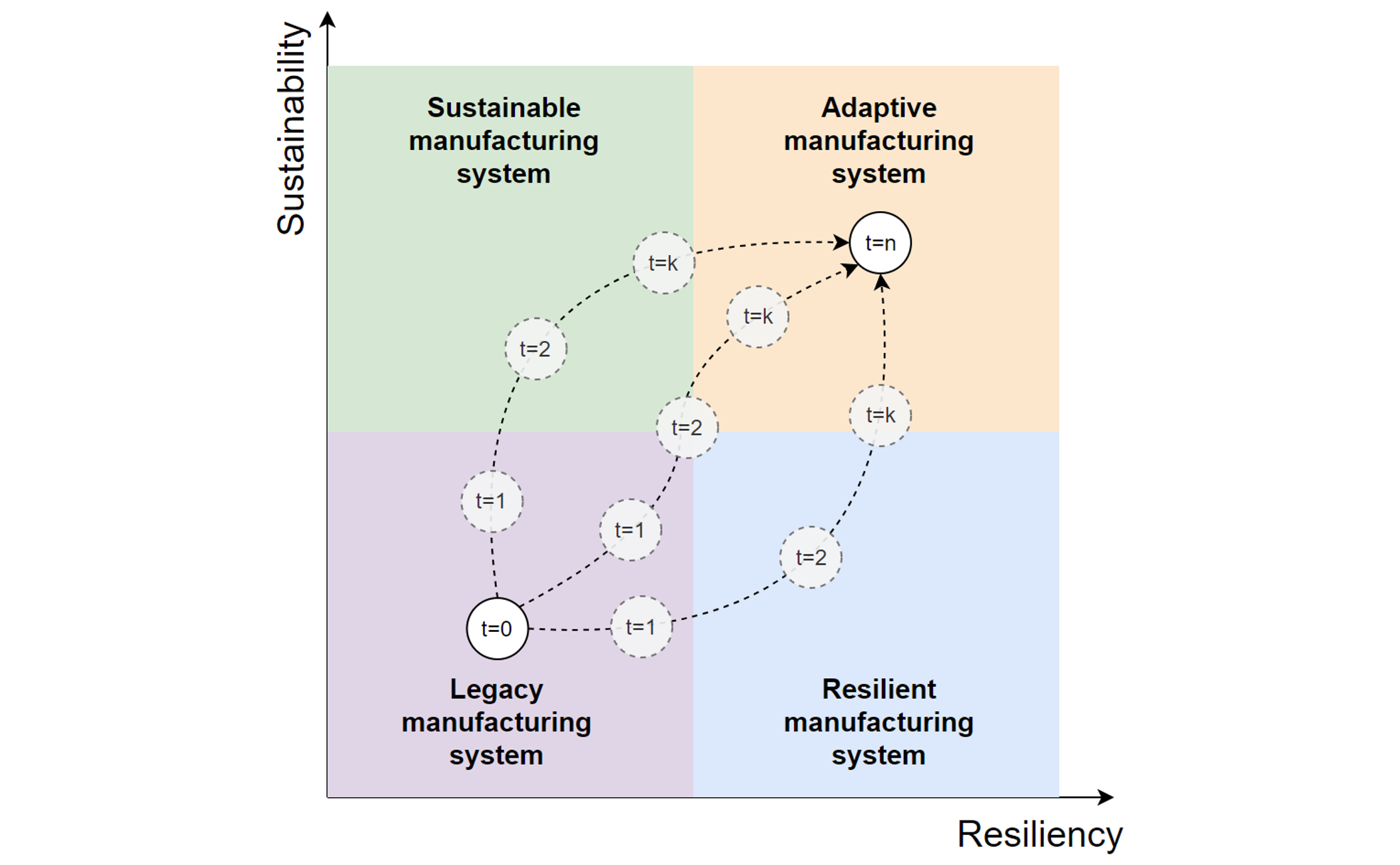
Towards Adaptive Manufacturing Systems: Planning and scheduling methods for more sustainable and resilient factories
Rafael Leite Patrão
The manufacturing sector faces increasing uncertainty due to systemic changes like the green and digital transitions. These changes offer opportunities for factories to become more sustainable and resilient, but they also create significant challenges for decision-makers at strategic, tactical, and operational levels. To help factories adapt while maintaining production goals, we explored two key technological enablers: reconfigurable machines and machine learning techniques. We defined a manufacturing system that is both highly sustainable and resilient, using such enablers, as an adaptive manufacturing system. To drive existing factories towards greater adaptability over time, while minimizing production disruptions, we develop production planning and scheduling models that consider sustainability and resiliency metrics and integrate both technological enablers.
19-09-2024 - Lecture Hall A
PhD presentation
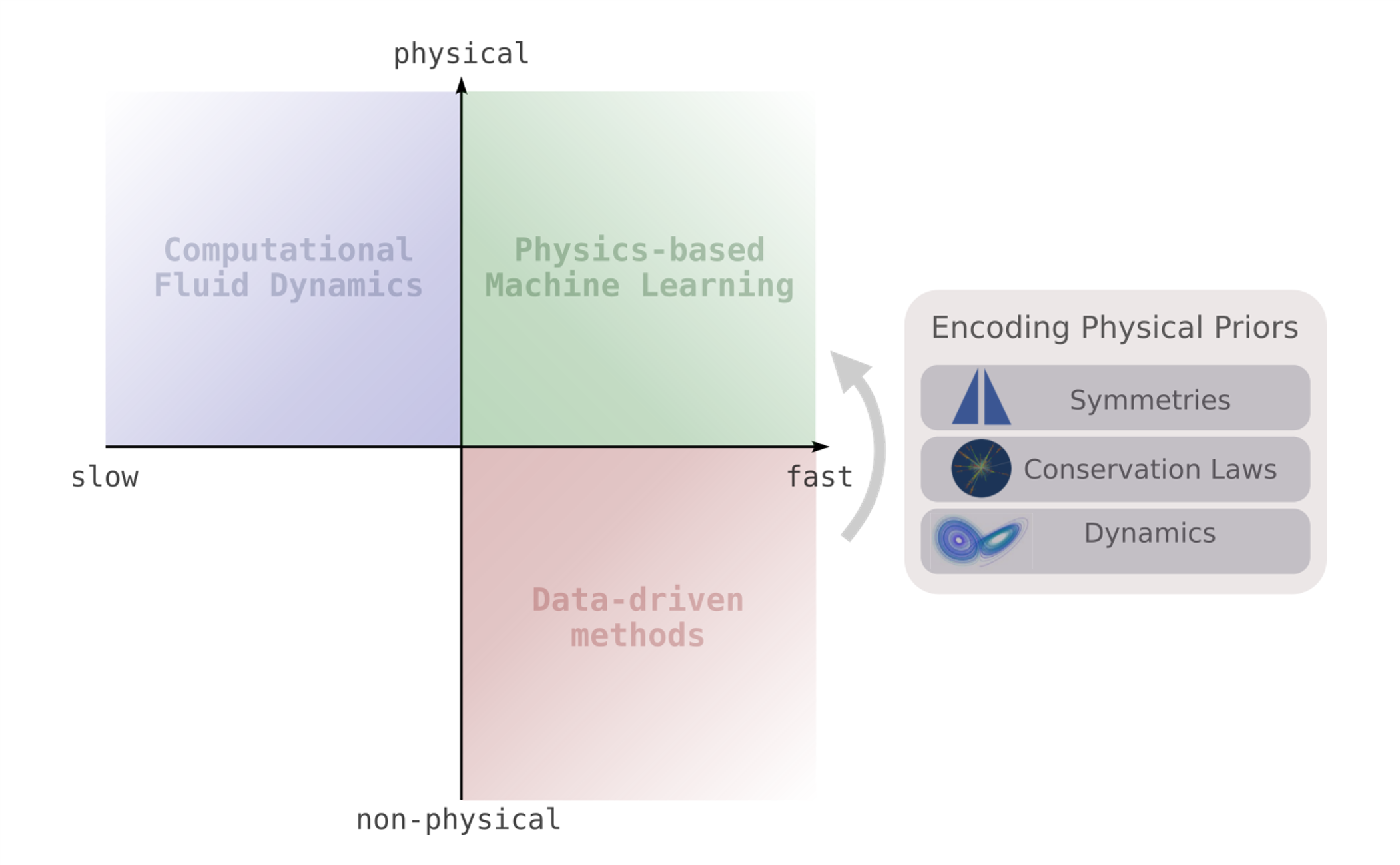
On physical-constraints in Scientific Machine Learning for fast flow field predictions
Manuel Cabral
Traditional fluid simulations, while highly accurate, are often too slow for many practical applications. Recently, machine learning has emerged as a promising alternative due to its ability to deliver fast predictions. However, ensuring the accuracy and physical consistency of these models requires the incorporation of physical priors. In this talk, we explore methods for embedding physical laws — such as symmetries and governing equations — into machine learning models, with a focus on fluid dynamics. By integrating these priors, we develop models that are not only more data-efficient but also smaller, making them well-suited for real-world applications where data and computational resources are often limited. Furthermore, we show that these physics-based models generalize better to previously unseen flow regimes, offering improved performance over purely data-driven approaches.
19-09-2024 - Lecture Hall A
PhD presentation
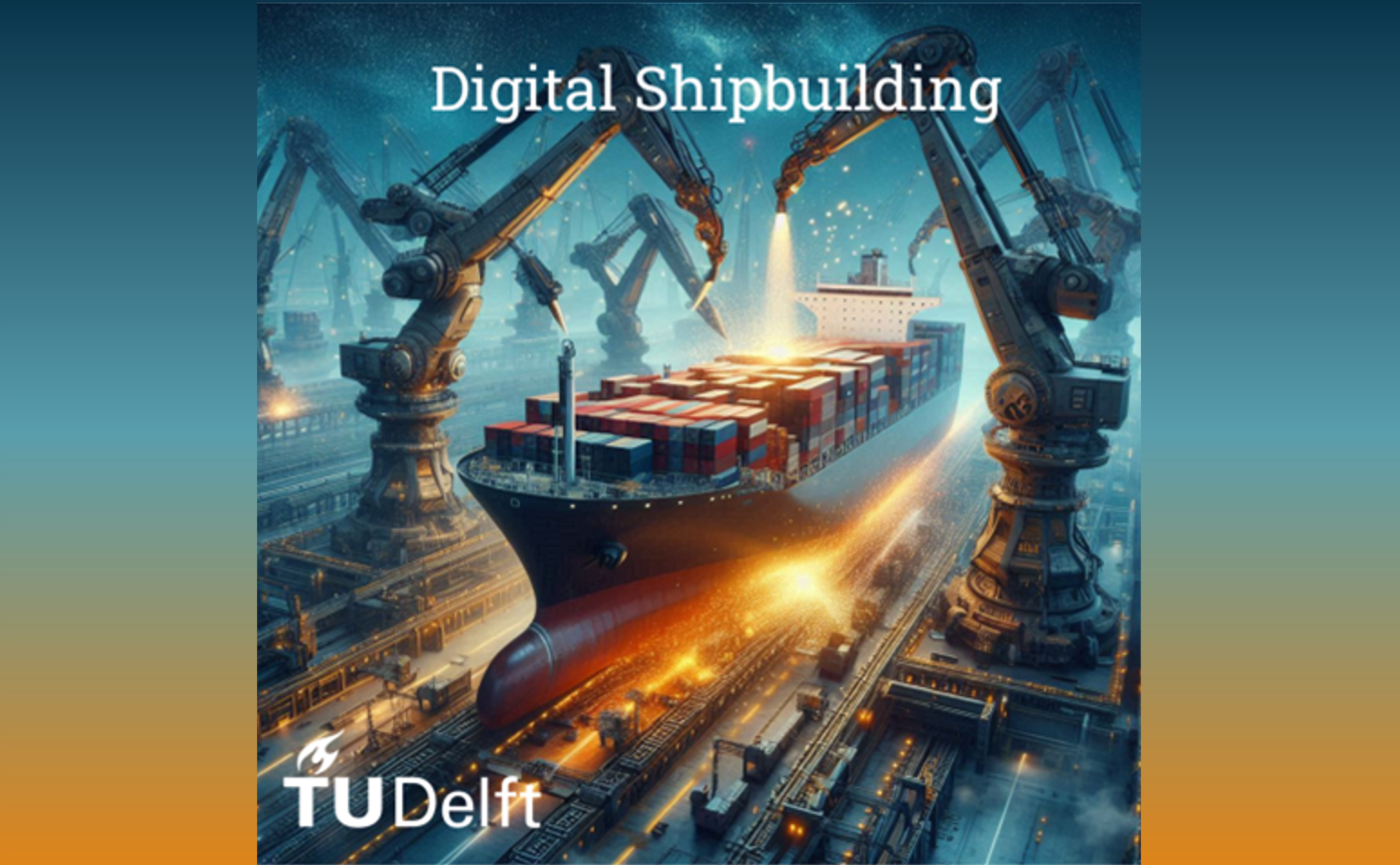
Digital Potential in Shipyards: A Path to Transformation
Miguel Calvache
Before diving into academia, I spent several years in the navy and the shipbuilding industry, where I saw firsthand the challenges shipyards face in keeping up with digital transformation. Now, as a PhD researcher, my work explores how digital technologies can reshape shipbuilding processes, addressing declining throughput and competitiveness. Using a mathematical model, I (try to) analyze the financial benefits of various technologies and apply innovation theories to understand why shipyards have been slow to adopt new systems. Join me this week as I share my journey from shipbuilding to digital transformation, and discuss the challenges and opportunities for the industry in the digital age.
12-09-2024 - Lecture Hall A
Mini-Symposium: Technical Talk
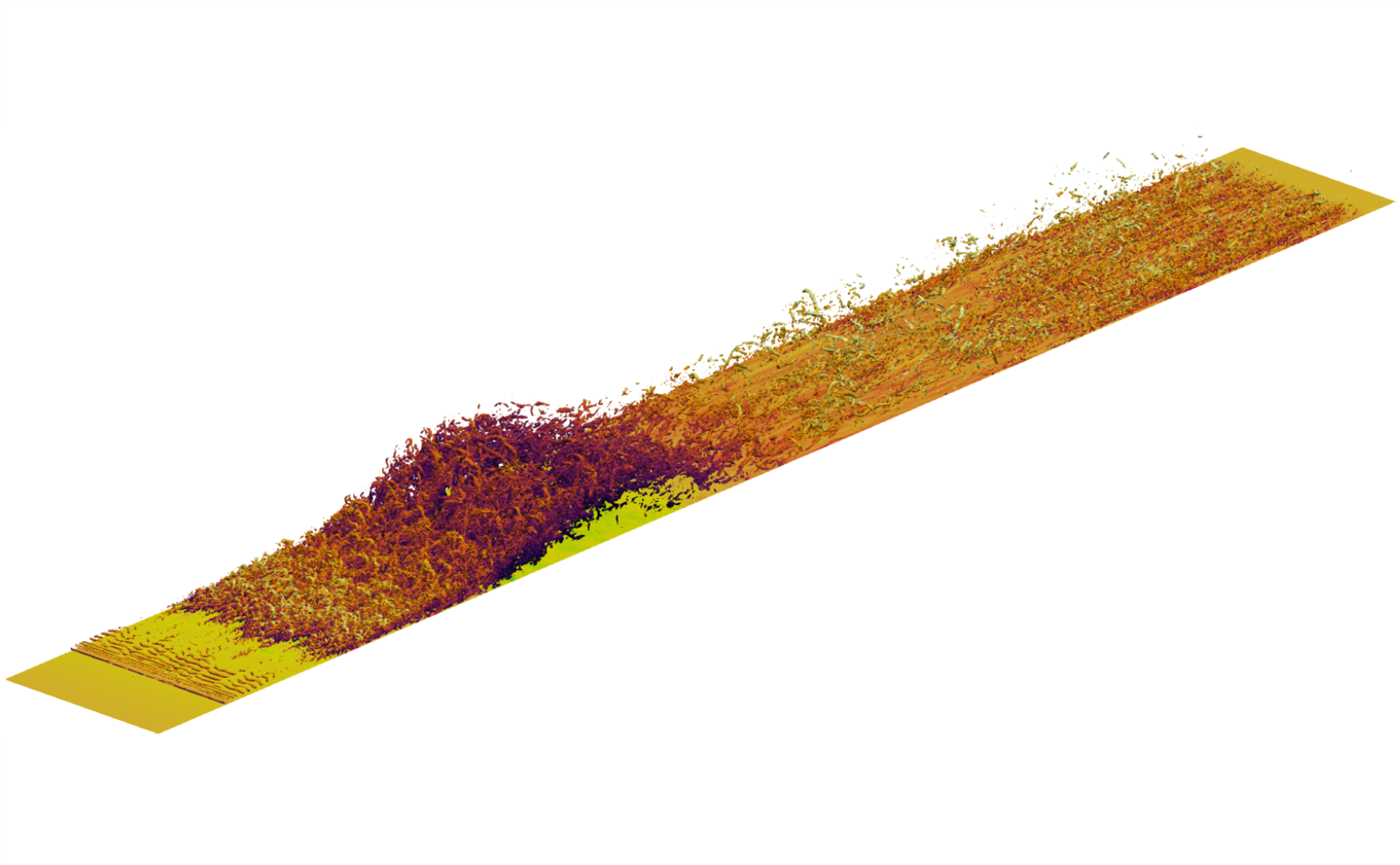
Perspective and applications of data-informed CFD
Bernat Font
The widespread adoption of data-driven modeling tools and advances in hardware architectures across the scientific computing community have also shaped the future of CFD solvers. In this context, we will review the opportunities and challenges arising from the use of ML models in scale-resolving turbulent flow simulations. As examples, the cases of data-driven turbulence modelling, and active flow control using reinforcement learning will be discussed. We will also introduce our flagship CFD solver, WaterLily, and discuss future research directions.